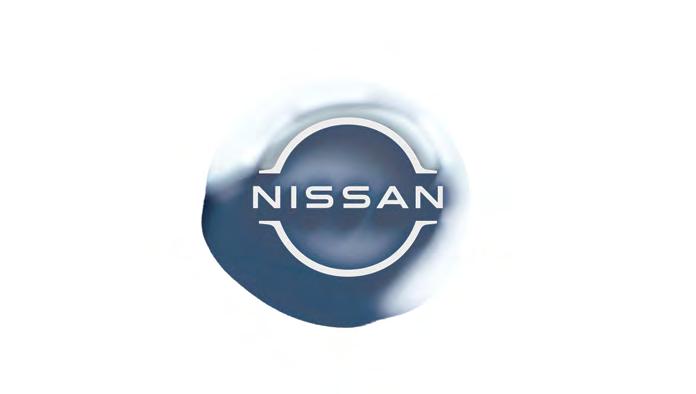BUILDERS OF TOMORROW
MEET THE RISING STARS REDEFINING
UAE’S REAL ESTATE HORIZON


MEET THE RISING STARS REDEFINING
UAE’S REAL ESTATE HORIZON

SCULPTS DUBAI’S SKYLINE INTO A TAPESTRY OF VISIONARY BRILLIANCE, WHERE LUXURY AND DESIGN CONVERGE IN POETIC HARMONY

New IVECO S-Way: high technology and efficiency on all missions
A wide choice of Euro III / V diesel engines, delivering class-leading power from 360 hp to 560 hp Euro III / 570 hp Euro V and superior fuel economy. 12-speed HI-TRONIX automated transmission with the most advanced technology in its category, electronic clutch and best-in-class torque-to-weight ratio. Full range of fuel-saving devices, such as anti-idling feature, EcoSwitch, Ecoroll and Smart Alternator. Top levels of comfort and safety, with a completely redesigned and reinforced cab, featuring enhanced direct visibility and enlarged cab livability.





Nestled by the coast of Lusail sits the splendor of Raf es and Fairmont Doha, where luxury is rooted in even the smallest details. Open the doors to mesmerizing hospitality and make memories in a world of sophistication.



Editor-in-Chief
Vibha Mehta vibha@bncpublishing.net
CEO Wissam Younane wissam@bncpublishing.net
Director
Rabih Najm rabih@bncpublishing.net
Group Publishing Director
Joaquim D'Costa jo@bncpublishing.net
Commercial Director
Andrea Mocay andrea@bncpublishing.net
Editorial Assistant
Aya Zhang aya@bncpublishing.net
Creative Lead Christian Harb chriss@bncpublishing.net
Editorial Design
Rizaldi Febrian
Marketing Executive
Aaron Joshua Sinanbam aj@bncpublishing.net
Videographer
Eduardo Buenagua
Images used in Construction Business News Middle East are credited when necessary. Attributed use of copyrighted images with permission. All images not credited courtesy Shutterstock.
subscriptions@bncpublishing.net
PO Box 502511 Dubai, United Arab Emirates P +971 4 4200 506 | F +971 4 4200 196
For all commercial enquiries, contact jo@bncpublishing.net T +971 50 440 2706
All rights reserved © 2025. The opinions expressed are solely those of the contributors. Construction Business News Middle East and its affiliated publications in the MENA region are exclusively licensed to BNC Publishing. No part of this magazine may be copied, reproduced, or transmitted in any form or by any means without prior written consent from the publisher.
Printed by United Printing and Publishing | upp.ae
Keep up to date with all the latest news, features and much more on our website and social media platforms




Require formwork and scaffolding? Check out Doka’s extensive list of products and systems, which now includes scaffolding for a variety of applications. At Doka, our philosophy is to provide a broad range of services under one umbrella based on a growing demand for single-source solutions that adhere to the highest standards.
/DokaMEA /company/doka-middle-east-africa /doka_mea
meaapmarketing@doka.com | www.doka-me.com

As the chill of London’s winter embraced me, I fell in love with the city all over again. The festive spirit lingered in the air like an enchanting spell, as twinkling lights adorned every corner and the unmistakable aroma of mulled wine filled the crisp, frosty evenings. From the iconic Christmas markets to
the serene strolls through Hyde Park’s snowdusted paths, every moment felt like stepping into a postcard. The ringing carols, the warm cups of cocoa, and the joy of reconnecting with old friends brought a much-needed pause to life’s relentless pace.
Now, as I return to the warmth of Dubai, where the golden sands meet the azure skies, I am filled with an invigorating energy to embrace 2025. There’s something uniquely revitalizing about this city—it greets you with boundless possibilities and an unmatched dynamism that fuels your drive. The transition from the tranquil charm of London’s winter to the vibrant buzz of Dubai has been a refreshing reset, a perfect balance of rest and rejuvenation.
With this renewed vigour, I’m thrilled to kick off an exciting year ahead. Our calendar is already brimming with special editions and landmark events designed to engage, inspire, and celebrate our incredible audience. From innovative projects shaping our industries to trailblazing individuals pushing boundaries, 2025 promises to be a year of milestones and breakthroughs.
As I sit down to pen this note, I can’t help but feel a sense of gratitude—for the quiet moments of reflection during my London escape and for the exhilarating opportunities awaiting us in the months ahead. Here’s to a year of growth, creativity, and shared success. Let’s make 2025 extraordinary together!

Vibha Mehta Editor-in-Chief vibha@bncpublishing.net
Vibha Mehta vibhamehta01 @vibhamehta01

Bringing luxury seaside living to Sharjah for the first time, owners at the Anantara Sharjah Residences enjoy access to the Anantara Sharjah Resort’s world-class amenities, including an infinity pool, five distinctive restaurants, an Anantara Spa and a state-of-the-art gym. As an investment, owners can enjoy the benefits of a rental management scheme operated by Anantara Hotels, Resorts & Spas, allowing them to maximize their returns when they are not resident in the property.
To register your interest, visit arada.com
LIFE IS A JOURNEY.

Step into a world of opulence when you book a Suite at Raffles Doha.
Experience the added luxury of QAR 750 credit to spend on dining in the hotel, and QAR 500 towards any Spa treatment.
Children aged 12 and below are welcome to indulge in the enchantment of complimentary dining.
Rates starting from QAR 3,500 per night
For reservations, please call +974 4030 7100 or email reservations.doha@raffles.com


The Sustainable City – Yiti is setting a new benchmark for eco-friendly developments in Oman and the region
The Sustainable City –Yiti, the region’s first city committed to achieving net zero emissions by 2040, has reached a significant milestone with the completion of 96% of its infrastructure works. The eco-friendly community, designed to accommodate approximately 10,000 people, is set to be fully operational in 2026.
Significant progress has been made within the Sustainable District, with the central plaza infrastructure now fully completed and 31% of its construction finalized. Similarly, 33% of the villas and broader Sustainable District construction is complete. The school and nursery construction began in September 2024, following a groundbreaking ceremony.
The next phase of development will prioritize key community features, including a 4-star hotel, a wellness center, an autism village, an equestrian club, a sports complex, SEE Lab, bridges, public solar parking, and a biogas plant.
Developed by Diamond Developers, a subsidiary of SEE Holding, in partnership with Oman Tourism Development Company (OMRAN), The Sustainable City – Yiti sets a new benchmark for eco-friendly developments in Oman and beyond. The success of Phase One, which sold out completely, demonstrates a growing demand for sustainable living solutions.

Mahmoud Shehada, Chief Sales and Marketing Officer at The Sustainable City – Yiti, said, “This milestone marks a significant step forward in our journey to redefine urban living in Oman and the region. The Sustainable City –Yiti embodies our vision of creating thriving sustainable communities that prioritize environmental responsibility, innovation, and quality of life, which aligns with the sustainability objectives of Oman Vision 2040. As we near the completion of infrastructure works, we are one step closer to delivering a community that meets the growing demand for sustainable living and serves as a blueprint for net zero urban developments across the globe.”
Taking shape along the Gulf of Oman coastline near Muscat, The Sustainable City—Yiti is poised to become the largest operational sustainable community in the region and Oman’s first net zero-emission community by 2040. Spanning nearly one million square meters, this groundbreaking
development serves as a resilient and scalable model for low-carbon living, seamlessly integrating intelligent technologies to enhance sustainability.
The community is designed to reduce its residents’ per capita carbon footprint by an impressive 78% compared to conventional housing in Oman. This ambitious goal is achieved by addressing emissions across six core pillars of environmental sustainability: food, energy, water, products, mobility, and waste. The development incorporates eco-friendly materials in construction and interiors while aiming to be powered entirely by renewable energy.
Furthermore, The Sustainable City— Yiti is committed to 100% water recycling, 100% waste diversion from landfills, and 80% self-sufficiency in food production. These initiatives position the community as a leader in sustainable urban design and a blueprint for the future of eco-friendly living in Oman and beyond.
The company will oversee project management, cost management, and strategic consulting
for the landmark AlUla development
JLL has been awarded program management consultancy services with AlUla Development Company, a PIF company.
The agreement will see JLL provide project management, cost management, and strategic consulting services to oversee AlUla’s transformation into a global tourism destination. This includes real-estate strategy support and strategic guidance in the delivery and execution of its portfolio of hospitality, residential, retail, commercial, and infrastructure assets, from feasibility studies and project planning to construction and handover.
The signing ceremony in Riyadh formalized the appointment, with leaders from JLL and AlUla Development Company, including Sue Asprey Price, Fabien Toscano, James Allan, Saud Alsulaimani, Maroun Deeb, Ahmed AlHawas, and Talal AlMass, in attendance.
Maroun Deeb, Head of Project and
Development Services, KSA & Bahrain, JLL, said: “We are honoured to have been chosen to support the AlUla Development Company on such a significant project. This appointment reinforces our reputation as one of the region’s leading project and program management consultancies. By leveraging our expertise in large-scale projects, construction data insights, leading technology, and sustainable practices, we will ensure better client outcomes.”

continue to build upon our legacy in Saudi Arabia and drive forward AlUla’s ambitious development agenda.”
Saud Alsulaimani, Country Head KSA, JLL, said, “JLL has been at the forefront of AlUla’s transformation from the very beginning, being one of the first companies to work on this iconic destination. Our deep-rooted expertise in supporting the Kingdom’s vision of economic diversification and sustainable growth positions us uniquely for this appointment. We are committed to delivering exceptional value and impactful results as we
The new appointment builds on JLL’s experience in Saudi Arabia, where the Project & Development Services team delivers major projects and programs across the Kingdom with a capital value under management of US$30 billion. The team offers integrated development management, project and program management, cost management, fit-out and workplace design, engineering design and sustainability, HSE, and digital solutions.

The iconic 47-story tower ushers in a new era of luxury living, offering exclusive residences and Saudi Arabia’s first Trump Club
Dar Global, the London-listed luxury real estate developer, announces the launch of the prestigious Trump Tower Jeddah, a SAR 2 billion architectural masterpiece. This partnership with the Trump Organization brings the Kingdom a new level of opulence and exclusivity. Gracing Jeddah’s Corniche, this 47-floor tower will stand as one of the city’s tallest residential towers.
Strategically located near other iconic landmarks, Trump Tower Jeddah is more than just a residential project; it is a lifestyle revolution. Among its highlights is the Trump Club, the Kingdom’s first-ever members-only social club slated to be the ultimate destination for the city’s elite.
Trump Tower Jeddah offers a diverse range of luxury residences with breathtaking views of the Red Sea. The project’s premium finishes, world-class facilities, and integration of green spaces promise an unmatched living experience that balances luxury with environmental responsibility.
Ziad El Chaar, CEO of Dar Global, highlighted the project’s pivotal role: “Jeddah is undergoing a remarkable evolution, moving from traditional housing to dynamic high-rises, mixed-use developments that reflect modern living preferences. Trump Tower Jeddah will be a key enabler of this shift, combining ultra-luxury with the vibrancy of modern life. Our ongoing collaboration with The Trump Organization not only redefines luxury living but also strengthens Jeddah’s position as a world-class urban hub.”
Eric Trump, Executive Vice President of The Trump Organization, added: “We are delighted to collaborate with Dar Global on our third project together, further expanding our footprint in the Middle East and growing the Trump standard of luxury in the region. Trump Tower Jeddah is a testament to our commitment to excellence and innovation. Together, we are creating a landmark project that reflects the vision and aspirations of Jeddah, offering an unparalleled residential and lifestyle experience that will set the standard in luxury for years to come.”
This venture builds on the successful decade-long relationship between The Trump Organization and Ziad
El Chaar and Dar Global, with projects such as the highly anticipated AIDA development in Oman, Trump International Resort, Golf Club & Residences, and the most recent announcement of Trump International Tower Dubai.
Among other projects, Dar Global is also working on a mega-development to construct 200 new residential villas in Riyadh. The company’s debut in the Saudi market is part of its broader strategy to introduce its internationally recognised standards of luxury to Saudi Arabia’s burgeoning real estate sector. With a proven track record across the Middle East and Europe, Dar Global is set to deliver unparalleled sophistication to a market increasingly defined by discerning, globally mobile buyers.

This green steel, produced through EMSTEEL and Masdar’s groundbreaking green hydrogen project, sets a new standard for sustainable construction in the MENA region

Modon, a master developer known for vibrant and sustainable communities, and EMSTEEL Group, the UAE’s largest steel and building materials manufacturer, have signed an MoU establishing Modon as the first real estate developer to use low-carbon steel in the UAE.
Aligned with the UAE’s Net-Zero 2050 Strategy, the partnership aims to facilitate decarbonisation across the construction value chain in the UAE and the broader region. This green steel, sourced from the EMSTEEL Group and Masdar’s pioneering green hydrogen pilot project—the first of its kind in the MENA region—sets a new benchmark for sustainable and responsible construction practices.
Ibrahim Al Maghribi, CEO of Modon Real Estate, said: “We are delighted to partner with EMSTEEL in this pioneering initiative. This strategic alliance underscores our commitment to sustainability and positions Modon as a leader in adopting low-carbon building materials. By integrating green steel into our projects, we are taking a significant step towards reducing our carbon footprint and supporting the UAE’s green targets. This collaboration is a testament to our dedication to creating vibrant, sustainable communities that align with the UAE’s net-zero 2050 strategy.”
Saeed Alghafri, CEO of Emirates Steel, part of EMSTEEL Group, said: “With the recent launch of our green hydrogen pilot project with Masdar, we are elevating our utilisation of clean energy and laying the
foundation for future implementation of clean hydrogen for green steel production at scale, contributing directly to the UAE’s net-zero strategy and national hydrogen economy targets. As the first steelmaker in the world to capture its CO2 emissions and the first steelmaker in the MENA region to demonstrate green hydrogen for green steel production, we believe that our partnership with Modon will play a key role in building our efforts to decarbonise industry at scale. We are excited to continue exploring the potential that such ground-breaking partnerships can promise to the wellbeing of future generations.”
Across the UAE, green targets include fully deploying clean energy in the energy mix to reach net zero by 2050. With such clear goals in place, the UAE’s real estate industry has increased its focus on sustainable buildings to comply with the current green building regulations in the UAE, such as Abu Dhabi’s Estidama Pearl Rating System. Sustainable building materials, including steel, are being promoted through the National Green Certificates Program, launched by the UAE Ministry of Energy and Infrastructure in July 2024.

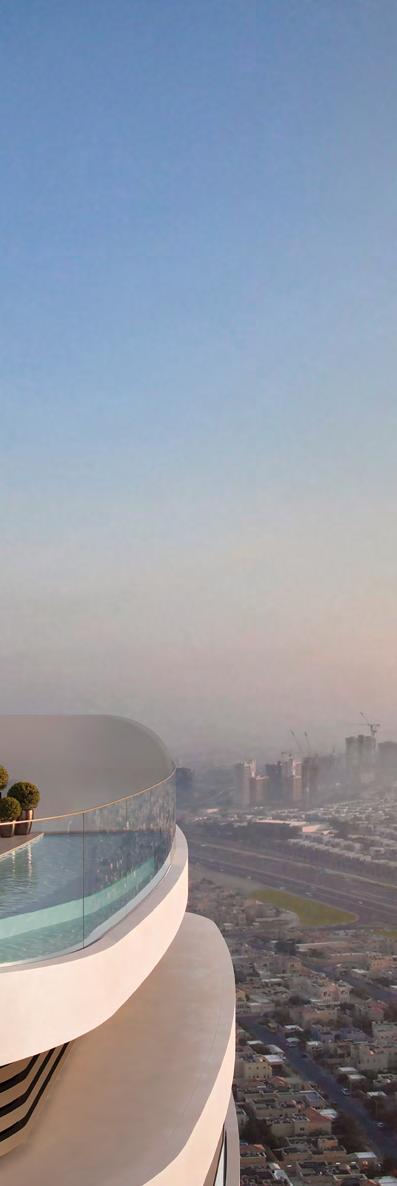
Karim Nasser, Marketing Director at SAAS Properties, shares insights into the company’s core principles and its journey to becoming an industry leader
Since its inception, SAAS Properties has firmly established itself as a leader in the UAE’s luxury real estate market by delivering iconic projects that redefine sophistication and lifestyle. With a diverse portfolio spanning residential and commercial developments, SAAS Properties has set benchmarks in architectural excellence and community enhancement. Flagship projects such as One Reem Island and Reem Eleven in Abu Dhabi and SAAS Hills in Dubai epitomize innovative concepts in luxury living. These developments blend modern beachfront escapes with minimalist elegance and state-ofthe-art amenities. The company’s unwavering commitment to innovation, sustainable practices, and tailored experiences has solidified its reputation as a trusted leader in the luxury real estate industry.
Developing iconic projects like One Reem Island and Reem Eleven posed challenges such as adhering to tight timelines while maintaining exceptional quality standards and managing the complexities of integrating advanced design elements with sustainable solutions. These challenges were overcome through meticulous planning, collaboration with world-class architects and consultants, and cutting-edge construction technologies. “By prioritizing transparency and fostering a proactive approach to problem-solving, we ensured seamless execution while staying true to our vision of delivering excellence,” adds Karim Nasser, Marketing Director at SAAS Properties.

SAAS Hills sets a new benchmark in luxury living by offering a diverse range of thoughtfully designed amenities that cater to residents’ varied lifestyles while maintaining an uncompromising focus on elegance and comfort. Located in Dubai Science Park, the development features two towers—SAAS Hills Tower A and Tower B—and provides a harmonious blend of urban convenience and serene living. Executive business hubs and private venues also offer ideal spaces for professionals and social events. Exclusive features such as a sandy beach-style pool, an indoor rockclimbing wall, yoga studios, and a
community kitchen cater to wellness enthusiasts and social gatherings. For families, vibrant kids’ play areas and wellness spas ensure holistic living experiences.
“Cutting-edge technologies like Vortex Biotech’s VLED air purification system, which debuted at SAAS Hills, ensure healthier living environments by neutralizing bacteria, viruses, and mould,” shares Karim.
The sky villas offer panoramic views and spacious, sleek interiors for the ultimate luxury experience, while executive business hubs and private venues provide ideal spaces for professionals and social events alike.
By combining worldclass amenities such as retail spaces, state-of-the-art fitness centres, immersive entertainment options like private cinemas, and exceptional concierge services, SAAS Hills epitomizes SAAS Properties’ commitment to redefining luxury real estate by blending innovation, wellness, and elegance into every aspect of modern living.
The integration of Vortex Biotech’s VLED technology in SAAS Hills underscores SAAS Properties’ dedication to innovation and wellness. The technology enhances air quality by inactivating viruses, bacteria, and mold for a healthier living environment. This alignment of technology and health
reflects the company’s commitment to modern real estate.
Sustainability and eco-friendly designs are central to SAAS Properties’ vision of redefining luxury real estate. The company integrates environmentally conscious practices into its developments, ensuring they meet high standards of sophistication while contributing to a greener future. Projects like Reem Eleven feature smart home systems that optimize energy efficiency and reduce carbon footprints, while SAAS Hills incorporates Vortex Biotech’s VLED technology to enhance air quality and energy efficiency. SAAS Properties sets new benchmarks for responsible real estate development by employing resource-efficient construction methods and promoting energy-efficient technologies.
Karim explains, “Through these efforts, SAAS Properties delivers world-class projects and supports the UAE’s broader sustainability goals. This forward-thinking approach ensures that every development enriches communities while preserving the environment for future generations.”
SAAS Properties supports the UAE’s vision for economic sustainability through innovative developments that attract global investment and enhance quality of life. Projects like SAAS Hills and the upcoming SAAS Business Tower align with the Dubai Economic Agenda (D33), contributing to economic diversification and urban development. By creating communities that embody luxury and innovation, SAAS Properties drives the UAE’s ambition to reinforce its global standing through transformative real estate projects.
“At SAAS Properties, we uphold our competitive edge in the UAE’s opulent luxury real estate market by meticulously crafting exquisite developments in prime locations such as Reem Island in Abu Dhabi and
Step into a new era of sophistication with SAAS Hills_ exclusive Sky Villas. These modern, twostory living spaces offer sleek interiors, premium amenities, and breathtaking full panoramic views of Dubai’s skyline
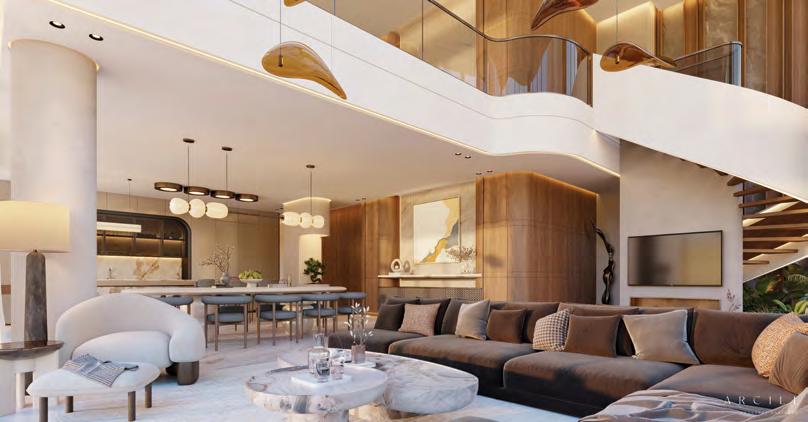
the vibrant urban landscapes of Dubai,” highlights Karim. These prestigious locales offer an unparalleled blend of sophistication and convenience, appealing to local and international buyers seeking luxurious living.
Developments like Reem Eleven offer smart home systems, eco-friendly designs, and amenities such as a rooftop jacuzzi, spa, sky pool, and state-of-the-art cinema. SAAS Properties ensures that each project meets luxury buyers’ expectations while contributing to a sustainable future.
“By integrating cutting-edge technology and sustainability into our projects, we ensure that our properties meet and exceed market expectations. Our focus on creating holistic living solutions, where residents enjoy premium experiences within thoughtfully curated environments, enables us to maintain a strong competitive edge,” says Karim. Through innovative design, eco-friendly features, and luxurious amenities, SAAS Properties delivers homes that define the future of luxury living in the UAE. By developing remarkable properties in coveted locations, they position themselves at the forefront of the luxury real estate sector, consistently offering bespoke solutions for an elite clientele.
SAAS Properties is expanding its presence in Abu Dhabi and Dubai, aligning with the UAE’s vision for economic diversification and sustainable development. Through projects like Reem Eleven and SAAS Hills, the company
enhances the UAE’s standing as a global hub for luxury real estate, integrating innovation and architectural excellence to support long-term economic sustainability.
“As we expand our portfolio, we will continue to invest in research and market analysis to identify emerging trends and demands within the luxury segment. This proactive approach will enable us to tailor our offerings to meet the evolving needs of discerning clients, ensuring that we remain at the forefront of the market,” comments Karim. Correspondingly, their commitment to architectural excellence and premium quality will be unwavering as they forge ahead, allowing them to attract investors and homeowners alike.
SAAS Properties plans to leverage strategic partnerships and collaborations with industry leaders to enhance capabilities and expand its reach. Focusing on residential and commercial sectors, the company aims to develop mixed-use projects that integrate living, working, and leisure spaces, fostering vibrant communities. “This holistic vision not only enriches our residents’ lives but also reinforces our position as a leading tier-one real estate company, setting new standards of luxury and sophistication in the UAE’s dynamic property landscape. As we embark on this journey, our unwavering dedication to innovation and excellence will ensure that SAAS Properties remains synonymous with the best in luxury real estate,” concludes Karim.
Object 1, part of the global TSZ Group operating in Spain and the UAE, blends innovation, vision, and expertise to craft inspiring urban spaces for living, working, and thriving
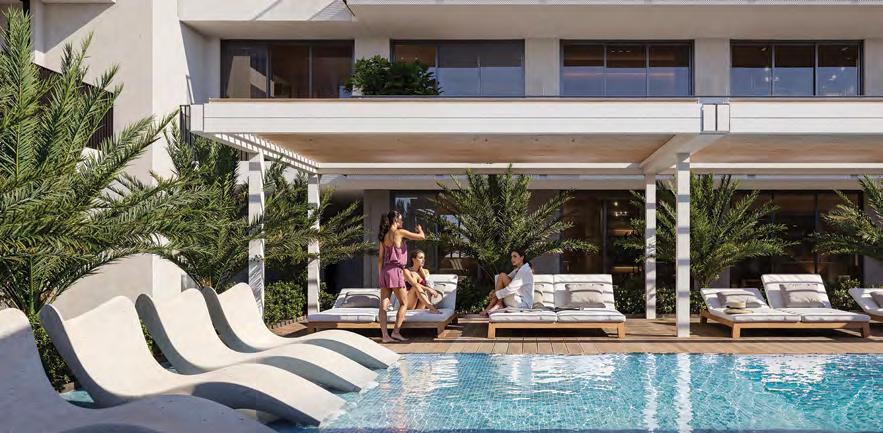
As the UAE positions itself as a global real estate leader, rapid urbanization and harsh climatic conditions have placed immense pressure on energy, water, and natural resources, with buildings consuming up to 70% of the nation’s total energy. The UAE, ranked 14th globally for its concentration of sustainable buildings, is rising to meet these challenges through innovative real estate development. Green buildings, which can reduce energy and water usage by 30%, lower operational costs, and enhance property value, are at the heart of the nation’s vision for a resilient, eco-conscious future.
A recent report from the Royal Institution of Chartered Surveyors (RICS) revealed that occupier and investor demand for green buildings has risen in the Middle East and Africa (51%) ahead of the global average (44%). 80% of UAE real estate investors prioritize sustainability, with 70% of foreign investors willing to pay a premium for green properties. This shows that the time for green building development and investment is now.
What is the Difference at the Construction Stage?
Sustainable construction departs from traditional methods by emphasizing minimal environmental impact and resource efficiency. LEED standards now guide over 5,300 projects across the MENA region, spanning 1.5 billion square feet. Green Building and Sustainable Building standards were introduced in 2022, aiming to cut energy use by 25% and water consumption by 16%, underscoring the UAE’s commitment to green building practices.
Sustainable methods incorporate prefabrication, on-site renewable energy, and waste recycling. RICS revealed that the top priorities for the MEA region are sustainable buildings that minimize water consumption (40%), provide good indoor environmental quality (37%) and are energy efficient (40%). Technologies like Building Information Modeling (BIM) optimize resource use, while each Emirate’s green building regulations, such as Abu Dhabi’s Estidama and Dubai Green Building Regulations (DGBR), ensure compliance with energy and water efficiency standards.

Incentives for sustainable projects, including reduced fees and fast-track approvals, have attracted developers and investors. For instance, the DGBR promotes sustainable materials, energy-efficient HVAC systems, and lighting while emphasizing water conservation through efficient fixtures and greywater recycling. It also integrates renewable energy systems like solar photovoltaics to minimize buildings’ environmental footprints. Local examples like The Sustainable City in Dubai achieved nearly zero construction waste, demonstrating the feasibility of eco-friendly practices.
Eco-conscious buildings extend beyond individual buildings to holistic urban planning. They combine innovative materials and smart technologies to enhance energy efficiency and minimize carbon footprint. Locally sourced materials such as green concrete, recycled steel, and bamboo reduce emissions during production and align with frameworks like the Dubai Clean Energy Strategy 2050. Advanced insulation and LED lighting complement these efforts, lowering energy demands while ensuring durability in harsh climates.
Smart technologies also play a pivotal role. Energymonitoring systems, EV charging stations, and high-quality air filtration systems contribute to sustainability and enhance occupant well-being. Eco-conscious developers like Object1 have incorporated various features in their projects, including water-saving fixtures, energy-efficient designs and appliances, sustainable landscaping, and advanced water purification and energy monitoring systems. Developments should include ample green spaces, convenient access to public transportation, and support for local businesses. Such initiatives reflect the UAE’s broader commitment to carbonneutral living, aligning with goals to source 75% of Dubai’s energy from renewables by 2050.
Despite their long-term benefits, sustainable real estate projects often face hurdles such as high initial costs and insufficient carbon offset frameworks. Educating stakeholders about the financial viability of green investments—through reduced operational expenses, energy savings, and increased property values—is critical. Scaling these practices across all market segments will be essential in achieving the UAE’s ambitious sustainability goals.

Collaboration among developers, policymakers, and investors is key to overcoming these barriers. Programs like the Building Efficiency Accelerator, a partnership between Dubai’s government and the World Resources Institute, offer technical assistance and training to cities adopting sustainable building practices. Such initiatives ensure that sustainability becomes a cornerstone of urban development, driving long-term economic and environmental benefits.
Sustainability in real estate is no longer a niche trend but a necessity. The rising demand for green buildings in the UAE—ahead of the global average—signals a shift in market dynamics. Sustainable homes boost property values and rental yields and align with the nation’s vision for an ecofriendly future.
Developers, investors, and consumers must embrace sustainable practices to drive meaningful change. They can contribute to environmentally responsible urban landscapes by prioritising green technologies and materials. The UAE’s leadership in sustainable real estate offers a roadmap for the global community, proving that economic growth and environmental stewardship can go hand in hand.
Mohamed Moussa, Manager of Project Delivery at Masdar City, shares how stakeholder collaboration paved the way for groundbreaking, sustainable construction solutions and beyond…
Masdar City is a beacon of innovation, redefining the construction landscape and cementing the UAE’s role as a global sustainability leader. From its inception, this carbon-neutral city has merged cutting-edge technology with eco-conscious design, transforming how urban developments are envisioned and executed. By championing renewable energy, smart infrastructure, and sustainable practices, Masdar City has inspired a new era of green construction across the region. Its collaborative approach, engaging global stakeholders, has created an iconic urban oasis and revolutionised construction methodologies, setting a benchmark for future-ready, resilient, and environmentally harmonious cities worldwide.


What inspired your passion for sustainable construction, and how has it shaped your approach to delivering projects at Masdar City?
My passion for sustainable construction is driven by the belief that the built environment should not only benefit the present but also leave a positive legacy for future generations. At Masdar City, this belief has become a guiding principle. Masdar City’s vision aligns with my values, motivating me to integrate sustainability at every project stage, from feasibility studies to tenant handover and operation. I focus on innovative solutions and strict environmental standards to contribute to Masdar City’s goal of being a global model for sustainable urban development, ensuring a lasting impact.
How do you balance environmental, social, and economic priorities in managing development projects within Masdar City?
At Masdar City, we employ a
Masdar City’s architecture blends modern design with sustainability to create iconic, energy-efficient spaces
comprehensive approach to balancing environmental, social, and economic priorities, which are crucial in managing development projects within the city. We carefully assess each project’s environmental impact while ensuring it fulfils community needs and remains economically sustainable. By utilising energy-efficient technologies, sourcing sustainable materials, and promoting collaboration with stakeholders, we develop projects that adhere to Masdar City’s mission and provide long-term value to residents and investors.
Can you share an example of a project at Masdar City where collaboration with stakeholders led to an innovative and sustainable construction solution?
Masdar City has gained worldwide recognition
due to extensive collaboration with its stakeholders. Our success is founded on the strong relationships we have developed and our mutual ambition and passion for achieving significant advancements in sustainability.
The Masdar Institute of Science and Technology (now known as Mohamed bin Zayed University of Artificial Intelligence) exemplifies this synergy. This project showcases state-of-the-art sustainable design and reflects the power of collaboration between various stakeholders, including architects, engineers, researchers, and the local community.
Furthermore, the Siemens Middle East Headquarters is another prime example of stakeholder collaboration fostering innovation. By working closely with Siemens, architects, and environmental consultants, we attained LEED Platinum

Masdar City Square (MC2) is a LEED Platinum and WELL Gold-certified complex, setting the bar for net-zero buildings
certification, making it one of the first buildings in the region to achieve this distinction. Integrating energyefficient facades, smart energy systems, and sustainable construction materials resulted in a building that operates 63% more efficiently than standard offices. This collaboration enhanced the building’s efficiency and highlighted Masdar City’s capability to deliver world-class, sustainable solutions through strategic partnerships.
What are the key challenges you face in implementing Masdar City’s high sustainability standards across all stages of development, and how do you overcome them?
Implementing Masdar City’s high sustainability standards throughout all stages of development presents various challenges, given the ambitious goals set for environmental performance, energy efficiency, and innovation. However, these challenges also provide valuable opportunities for creative problem-solving, collaboration, and leadership in the sustainable development field.
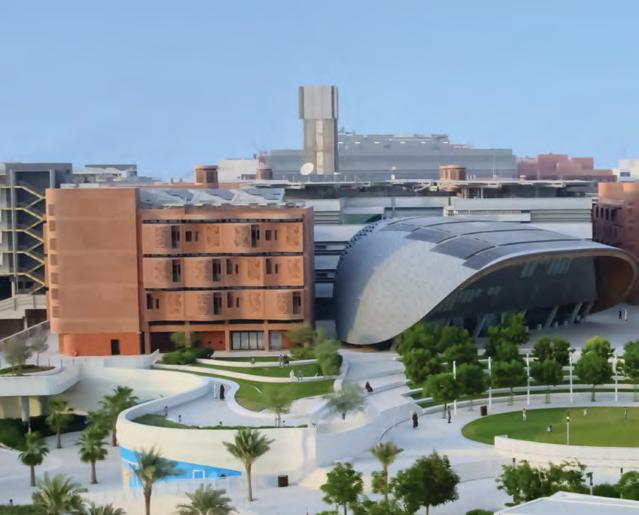
sustainability goals. At Masdar City, we have developed and implemented methods to ensure that our city continues to meet top standards and performance despite these challenges.
The primary challenges include cost, market demand, advanced technologies, material availability, and long-term sustainability performance. Nevertheless, these are not insurmountable. By fostering a culture of collaboration, utilizing cutting-edge technologies, engaging with stakeholders across sectors, and focusing on long-term outcomes, we can navigate these challenges and achieve the city’s ambitious
Having worked on landmark projects such as Palm Jumeirah and the UAE Pavilion at Expo 2020, how have these experiences influenced your approach to delivering world-class sustainable developments at Masdar City?
I have completed numerous projects, including two international high-end assignments that highlighted the importance of meticulous planning, stakeholder engagement, budget management, and attention to detail. Working on iconic projects such as Palm Jumeirah and the UAE Pavilion strengthened my capability to execute complex developments within tight
timelines while upholding high standards of quality and innovation. At Masdar City, I leveraged this expertise to ensure our projects met the highest criteria for sustainability and functionality, positioning the city as a global model for sustainable urban living.
How do your engineering background and extensive project and cost management training contribute to your ability to deliver projects that align with Masdar City’s sustainability goals?
My engineering background provides a robust technical foundation, enabling me to evaluate and implement innovative solutions effectively while comprehending the technical aspects of sustainable construction.

In addition, my extensive training in project and cost management allows me to integrate technical innovation with financial viability, ensuring that Masdar City’s stringent sustainability standards are met and exceeded. These combined competencies enable me to deliver environmentally responsible, economically feasible, and socially beneficial projects, perfectly aligning with Masdar City’s vision as a global model for sustainable urban development.
What opportunities do you see for future advancements in
sustainable construction practices, particularly for urban developments like Masdar City?
The future of sustainable construction for urban developments, such as Masdar City, presents numerous promising opportunities. Utilizing advanced materials, energy-positive buildings, smarter urban mobility, and efficient waste management solutions will make cities more resilient, resource-efficient, and environmentally restorative. By embracing these innovations, Masdar City can continue to be a leading example of sustainable urban development, inspiring other cities worldwide to implement similar practices. Success will depend on collaboration, innovation, and a longterm vision, ensuring that all developments are environmentally responsible and socially inclusive.

Abbas Sajwani, the maestro of dreams at AHS Properties, reimagines Dubai as a breathtaking canvas where architectural brilliance meets boundless imagination, crafting a symphony of elegance and visionary splendour

WORDS BY: VIBHA MEHTA
Sajwani, Founder and CEO of AHS Properties

Dubai has rapidly emerged as a global epicentre for luxury real estate, fostering a unique environment that encourages growth and innovation.
This city, strategically located at the crossroads of East and West, boasts world-class infrastructure and investor-friendly policies, making it an attractive destination for high-networth individuals (HNWIs) seeking unmatched luxury and opportunity. With its tax-friendly environment and excellent connectivity, Dubai has transformed the concept of modern luxury living, becoming the preferred locale for global elites.
As the demand for ultra-luxury properties continues to surge, it has reshaped Dubai’s skyline and solidified its status as a vibrant playground for developers like Abbas Sajwani, Founder and CEO of AHS Properties. Abbas emphasizes their distinctive approach, “We distinguish ourselves through a commitment to exclusivity, unparalleled craftsmanship, and an understanding of the lifestyle aspirations of our clientele. We don’t just create properties; we curate experiences. Our signature approach includes bespoke designs, prime locations, and integrated technology.”
AHS Properties enhances the luxury living experience through collaborations with renowned architects and interior designers. Killa Design, recognized for its work on the iconic Museum of the Future in Dubai, plays a pivotal role in shaping AHS Properties’ landmark developments, such as One Canal. Additionally, Hirsch Bedner Associates (HBA) is tasked with designing the interiors of One Canal, merging innovation with sophistication to transform modern living.
Further elevating its portfolio, AHS Properties partners with Fendi Casa,

Penthouse Serenity: The master bedroom where dreams are as grand as the views
the luxury fashion house’s interior design division, to offer Italianinspired interiors for projects like Casa Canal, exemplifying timeless elegance.
Location is central to AHS Properties’ appeal, with carefully chosen sites in Palm Jumeirah, Emirates Hills, and Dubai Water Canal. These premium locations provide stunning views, exceptional amenities, and privacy, setting a new benchmark in luxury real estate and delivering an unprecedented living experience for discerning clients.
Incorporating smart-home technologies is also crucial for their development. Abbas explains the
importance of this integration, “As the Founder and CEO of AHS Properties, I understand the central role of seamlessly integrated technologies in delivering maximum value to our clients. Since launching in 2021, our commitment to smart home innovations has enabled AHS Properties to distinguish itself in a highly competitive market. We continuously set new standards for convenience and sophistication in the ultra-luxury real estate space, keeping pace with the broader innovation and technology landscape of this vibrant city.”
Shaping Prestige Living Abbas envisions a new standard in

ultra-luxury property development. He believes true luxury goes beyond the usual expectations, focusing on crafting residences embodying architectural excellence, exceptional design, and personalized services. “For me, true luxury lies in the details—delivering not just a home, but a lifestyle that reflects the aspirations and individuality of our ultra-high-net-worth clients,” he expresses.
Their approach revolves around personalization, innovative designs, and top-tier services, ensuring each project resonates with their clients’ unique tastes and lifestyles. They collaborate with award-winning architects and designers to produce timeless
masterpieces that radiate elegance.
More than just visually stunning, these developments offer first-class concierge services, 24/7 security, and premium lifestyle management, ensuring residents experience a seamless and sophisticated living environment.
There is no doubt that diversification is a key component of the company’s growth strategy. By broadening its work scope and vision, the company focuses on innovation, which is essential for addressing the evolving demands of the market. “Our Vision at AHS Properties extends beyond traditional boundaries. As we continually strive to redefine excellence and elevate the lifestyle
experience, we are exploring strategic opportunities for expansion,” says Abbas. “We’re creating spaces that meet the diverse needs of our discerning clientele, ensuring that our portfolio remains dynamic and forwardthinking, delivering exceptional value while addressing the evolving needs of UHNWIs.”
Dubai’s real estate market is poised for remarkable growth in 2025, fueled by key factors reinforcing its status as a global powerhouse. The influx of expatriates and international investors, spurred by the Golden Visa residency program, has solidified Dubai’s reputation as a premier destination for long-term investments and unparalleled lifestyle opportunities. The city’s relentless push for economic diversification and groundbreaking infrastructure projects further cements its allure as a global business and tourism hub. These visionary efforts have created the perfect environment for sustained real estate expansion, attracting attention from investors worldwide.
The rising demand for ultra-luxury properties among high-net-worth individuals (HNWIs) from Europe, Asia, and the United States is a major driver of this surge. Enticed by Dubai’s unmatched lifestyle, exceptional amenities, and robust investment potential, this elite demographic favours
Elevated Workspaces: The office space in this five-bedroom residence blends function with finesse

the emirate’s most opulent residences.
Abbas continues, “Our Strategy is to continue to focus on High-Value Locations and keep investing in iconic areas with limited supply to maintain exclusivity and value. We are also eyeing global Markets and international opportunities and partnerships, all the while remaining focused on and committed to aligning our projects with Dubai’s various economic visions, which appeal to modern luxury buyers.”
With ultra-prime properties set to outpace other market segments in appreciation, Dubai’s real estate market is charting a steady and ambitious path forward. This trend underscores the city’s position as a leading global destination for luxury investments and highlights its enduring appeal as the epitome of modern, exclusive living.
Architectural innovation is essential to our development philosophy.
“By embracing cutting-edge design principles, we deliver visually stunning and functionally superior homes,” shares Abbas. This commitment to excellence is evident in Dubai, which
boasts numerous signature projects that exceed global standards.
Among these are The Palm Luxury Villas, known for their ultra-exclusive properties that showcase contemporary designs, expansive waterfront views, and integrated smart home technology. Similarly, the Emirates Hills estates feature a collection of bespoke mansions that epitomize luxury and extravagance. Together, these projects reflect a dedication to creating exceptional living spaces that seamlessly blend aesthetics and functionality.

Morning Glory: Wake up to stunning Dubai mornings in this five-bedroom duplex’s living and dining areas

Dubai’s architectural legacy showcases its ambition to establish and maintain its status as a premier global city. Iconic landmarks such as the Burj Khalifa, Palm Jumeirah, and the Museum of the Future are more than mere architectural achievements; they represent a commitment to innovation and a reimagining of the urban landscape. These structures not only reshape the skyline but also inspire worldwide admiration, reflecting Dubai’s relentless pursuit of excellence and pushing the boundaries of design while setting global benchmarks for architectural brilliance.
AHS Properties plays a significant role in this legacy through its dedication to excellence. By partnering with renowned designers from around the globe, AHS ensures that every property they develop is an exclusive masterpiece designed to distinguish itself in a competitive market. “Moreover, AHS Properties pioneers cutting-edge innovations in ultra-luxury developments, seamlessly aligning with Dubai’s forwardthinking vision. This commitment further reinforces the company’s support for Dubai as an architectural and lifestyle innovation leader, “ Abbas points out.
Elegant
Luxury transcends mere aesthetics; it is about crafting spaces that genuinely enhance the lives of those who inhabit them. “At AHS Properties, this philosophy is at the heart of everything we do. We achieve this balance through a meticulous and collaborative design process that brings together architects, engineers, and clients at every stage of development,” says Abbas. This approach ensures that their properties are visually stunning and highly functional, meeting each resident’s unique needs.
In addition to thoughtful design, they incorporate advanced smart technologies and innovations to simplify home management, seamlessly blending convenience with
sophistication while maintaining the elegance expected in ultra-luxury properties.
He continues, “Furthermore, our commitment to ergonomic layouts ensures that every space is designed with comfort, flow, and usability in mind. This careful attention to detail allows us to deliver homes that harmoniously integrate practicality and luxury, setting a new standard for refined living.”
Operational excellence is the bedrock of AHS Properties’ success, guiding their approach to realizing extraordinary properties. Their strategy involves a meticulous blend of precision, unmatched quality, and innovative techniques, ensuring that each project meets and exceeds expectations, ultimately redefining the concept of luxury living.
Abbas emphasizes, “Our commitment commences with thorough end-to-end project management. We leverage advanced technology for real-time monitoring and seamless coordination, allowing us to meticulously oversee every detail from planning to execution.”
The company’s success is further bolstered by strategic alliances with world-class contractors and suppliers, granting them access to top-tier materials and impeccable finishes that distinguish them in the luxury market. An unwavering dedication to quality complements this; rigorous inspections are embedded in every development phase. Such relentless attention to detail guarantees that each property meets and surpasses expectations, solidifying AHS Properties’ reputation for excellence and crafting homes that genuinely stand out.
AHS Properties has enjoyed impressive growth since its establishment in 2021, making significant strides in the luxury real estate sector. With key projects in Palm Jumeirah and Emirates Hills, the company has quickly gained a reputation for its innovative designs and high-quality developments. Notable accomplishments include the successful sales of premium properties and the launch of Casa Canal, featuring elegant Fendi Casa interiors. As of 2024, the company boasts a gross development value (GDV) of $2.7 billion. Looking ahead, AHS Properties is in a strong position, aiming for a GDV of $5 billion in the coming years, all while continuing to redefine luxury living standards in the market. Exciting new projects are poised to enhance the luxury lifestyle offerings further.
WORDS BY: VIBHA MEHTA
The United Arab Emirates has always felt like a land of endless possibilities to me. Every time I look at its shimmering skyline or walk through its vibrant streets, I’m reminded of how ambition, vision, and resilience can turn dreams into reality. For someone like me, who’s always been drawn to the extraordinary, the UAE isn’t just a destination—it’s an inspiration.
In just a few decades, the UAE has transformed itself in ways I never thought possible. What was once a modest trading hub is now a global powerhouse. Standing before iconic landmarks like the Burj Khalifa, I can’t help but feel a sense of awe. Developers like Emaar and DAMAC have reshaped the landscape, creating not just buildings but symbols of ambition that inspire millions, myself included. Whether it’s the grandeur of Downtown Dubai or the opulence of DAMAC’s developments, these are places that make you feel like you’re part of something bigger—a bold, shared vision of the future.
What excites me even more is the wave of new developers stepping into the spotlight. These emerging players are bringing fresh perspectives, pushing boundaries, and raising the bar for innovation. They’re not just building structures but crafting lifestyles and communities tailored to modern residents. Their projects range from boutique developments celebrating craftsmanship to large-scale sustainable communities seamlessly integrating nature and technology. Walking through these spaces, you feel a sense of refinement and thoughtfulness that goes beyond luxury— it’s about creating homes that truly resonate with people’s lives.

The UAE’s investor-friendly policies, such as long-term visas and tax-free ownership, make it a magnet for global real estate innovation. With the UAE strategically positioned as a gateway between East and West, the influx of talent and fresh ideas ensures the market remains dynamic and future-focused.
Looking ahead, I’m inspired by the UAE’s unwavering commitment to sustainability. It’s no longer just about creating iconic skyscrapers but also about building responsibly for future generations. Developers are prioritizing renewable energy, eco-friendly materials, and green technologies. The integration of smart systems and sustainable designs is no longer a novelty—it’s becoming the standard. These efforts underscore the UAE’s role as a global leader in innovation and environmental stewardship.
For me, the UAE is more than just a collection of skyscrapers and luxury homes—it’s a living, breathing testament to what’s possible when vision and determination come together. From Dubai’s towering landmarks to Abu Dhabi’s tranquil villas, every structure tells a story of ambition, resilience, and creativity. This is a place where the skyline isn’t just a backdrop—it’s a masterpiece that continues to evolve. And for those of us lucky enough to witness it firsthand, the UAE isn’t just a destination. It’s a reminder that when you dare to dream big, there truly are no limits.
To celebrate this transformative moment, we’ve curated a list of the rising developers who are setting new benchmarks in UAE real estate. These visionaries are not just shaping the future—they’re making history. Stay tuned because the best is yet to come!
*The companies are listed in alphabetical order, not in the order of ranking.


Ali Tumbi, a visionary entrepreneur and business leader, is the founder of AQUA Properties, established in 2005, and several successful ventures under the AQUA Group of Companies, including Locations - Holiday Homes, ATCON Constructions, HOAM, and TUMBI Hotels. With a career defined by innovation and excellence, Ali has revolutionised the UAE’s real estate, construction, hospitality, and asset management sectors, solidifying his reputation as a dynamic figure in the region’s business landscape.
Under his leadership, AQUA Properties has developed a diverse portfolio valued at over USD 1 billion, delivering worldclass developments that elevate living standards and redefine community lifestyles. These ventures consistently set benchmarks for innovation and quality, earning prestigious accolades such as the International Property Awards, Construction Innovation Awards, and multiple recognition from Forbes.
Since launching AQUA Developments in 2010, Ali Tumbi has brought lifestyle-oriented communities across Dubai to life. Recent developments reflect his unwavering commitment to spacious layouts, highend finishes, and most importantly, sustainable living solutions.
ALI TUMBI, Founder

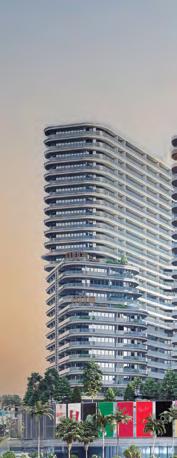
The Community in Motor City
Featuring over 414 thoughtfully designed units, this development is already 60% complete and promises a lifestyle rooted in convenience and activity.
The Central Downtown in Arjan Spanning 7 acres, this flagship development includes nearly 1,200 units and a 150,000-square-foot retail mall. With four towers and over 25 amenities, it redefines community living for modern families.
The Community in Sports City
This recently launched mixed-use development spans 66,628 sq. ft. and offers 396 meticulously designed units, many featuring integrated home offices. Its diverse amenities foster an active, interconnected lifestyle.
AQUA Properties continues to push the boundaries of luxury with groundbreaking projects such as TUMBI Hotels in Palm
Jumeirah, which is proudly part of the Hilton Tapestry Collection. Looking ahead, ambitious plans for developments along Sheikh Zayed Road underscore the company’s unwavering commitment to innovation and sustainability. By consistently delivering exceptional quality and setting new standards, AQUA Properties has cemented its position as a trailblazer in Dubai’s dynamic real estate landscape.
Ali Tumbi’s leadership has transformed industries and transformed industries and created spaces and experiences that redefine luxury, community, and modern living.
With a legacy of excellence and a focus on the future, Ali Tumbi continues to shape the UAE’s business and real estate

“At
The Community Motor introduces a fresh co-living concept, popular among Millennials and young professionals, fostering connection and a sense of family while easing financial pressures

landscape, laying the foundation for a brighter, more sustainable tomorrow.

AQUA Properties, we take pride in crafting more than just homes— we develop communities built on trust that offer luxury living and long-term sustainability. With two decades of transforming Dubai’s real estate landscape, we have redefined community living by creating spaces that inspire, elevate, and secure a brighter future. Guided by excellence and fuelled by innovation, we stay dedicated to delivering beyond expectations, ensuring that every step of the journey reflects our commitment to unparalleled quality and trust.”
- Ali Ashraf Tumbi
BEYOND, the latest venture from the OMNIYAT GROUP, marks a transformative step in Dubai’s real estate landscape. Catering to the broader luxury market, BEYOND offers innovative and exceptional living solutions that are accessible to a wider demographic. With a vision to transcend traditional real estate boundaries, BEYOND is committed to creating spaces that inspire, elevate, and redefine the living experience. Leading this ambitious initiative is Adil Taqi, the visionary CEO of Beyond Developments, who is passionate about revolutionizing how people interact with their environments through groundbreaking design and transformative projects.
Building on the success of its inaugural project, Saria, BEYOND has launched its second signature development, Orise, located in Dubai Maritime City (DMC). Designed by the globally acclaimed Nabil Gholam Architects and featuring exquisite interiors by Hirsch Bedner Associates (HBA), Orise sets a new benchmark in modern waterfront living. Offering panoramic views of Dubai’s skyline and Creekside, this development seamlessly blends urban sophistication with the tranquility of coastal living.
Strategically positioned at the crossroads of old and new Dubai, Orise boasts lifestyle amenities, lush green spaces, and unparalleled proximity to key destinations— just 10 minutes from Jumeirah and 15 minutes from Downtown Dubai. With Orise, BEYOND continues its mission to redefine luxury living, delivering thoughtfully designed spaces that balance nature and city life, setting a new standard for waterfront communities.

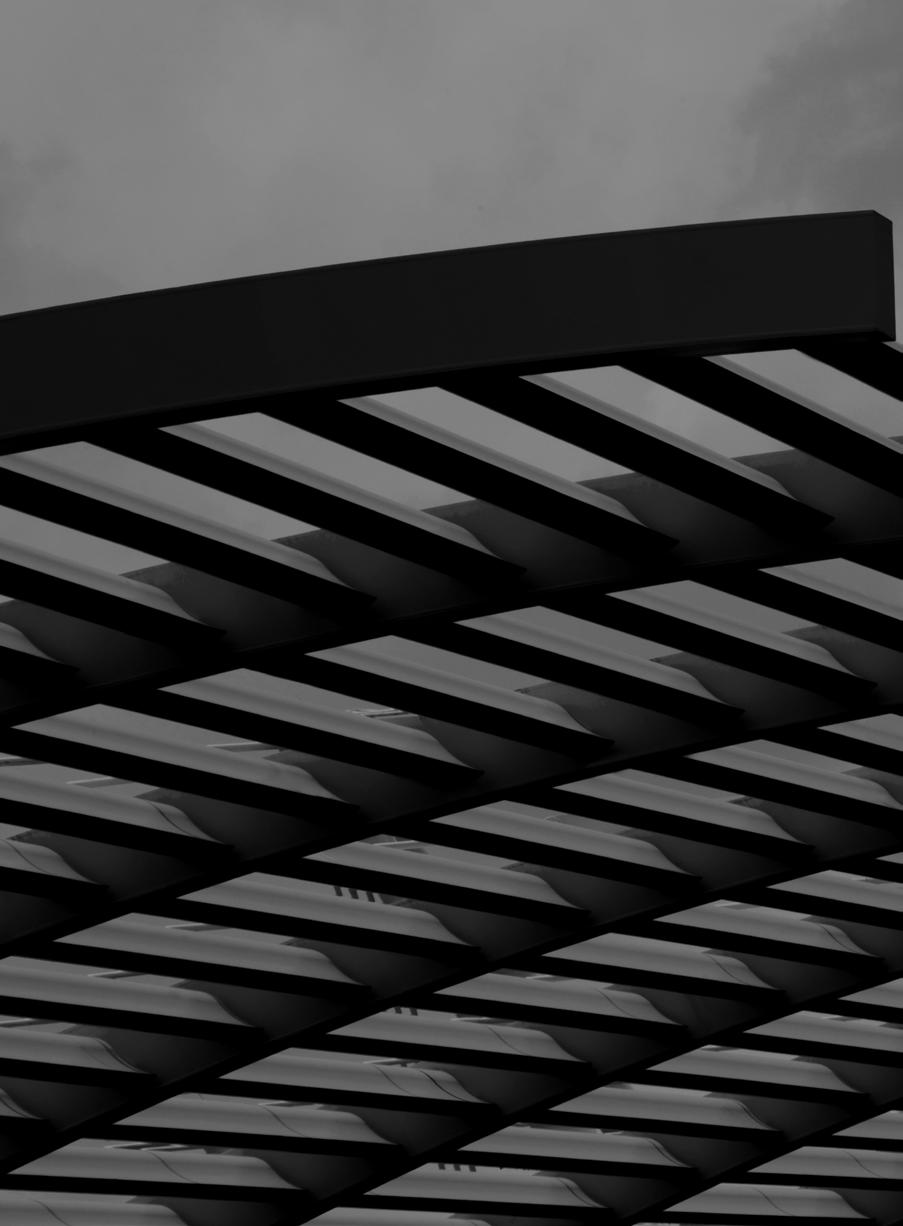
“Orise is a spectacular development, which has been flawlessly developed by the world’s best talents in architecture and design. We are proud to offer investors and owners an exceptional offering in one of Dubai’s most picturesque and coveted locations.”
- Adil Taqi







































RECOGNIZING INDIVIDUAL EXCELLENCE, CORPORATE STRENGTHS, AND PROJECT SUCCESS Nominate Now





















FOR EDITORIAL OPPORTUNITIES
VIBHA MEHTA +971 58 6314145 vibha@bncpublishing.net



AYA ZHANG +971 50 784 4794 aya@bncpublishing.net




FOR SPONSORSHIP OPPORTUNITIES
JOAQUIM D’COSTA +971 50 440 2706 jo@bncpublishing.net




ANDREA MOCAY +971 54 502 7927 andrea@bncpublishing.net











YOUSUF FAKHRUDDIN, CEO
Yousuf Fakhruddin, CEO of Fakhruddin Properties International and Board Member of Fakhruddin Holdings, is a visionary leader reshaping the real estate landscape in the UAE and beyond. With nearly two decades of experience, he has propelled the company from its humble beginnings into a global powerhouse with a presence in India, Uganda, and the UK.
Under Yousuf’s leadership, Fakhruddin Properties has evolved into a multifaceted entity, excelling in property development, management, facilities management, and hospitality. His forward-thinking approach emphasizes sustainability, energy efficiency, and cutting-edge technology, positioning the company as a high-tech leader in the industry. Flagship projects like Hatimi Residences in Dubai Islands and Maimoon Gardens in JVC embody his vision of creating wellness-focused, eco-friendly communities.
Maimoon Gardens reflects Fakhruddin Properties’ dedication to sustainable living and innovative real estate development. This pioneering project incorporates advanced eco-friendly practices, reducing environmental impact while improving residents’ quality of life. A robust waste management system includes floor-level collection points and an in-building composting facility, preventing around 1,250 tonnes of CO2 emissions annually. The project emphasizes energy efficiency with smart automation and efficient lighting, potentially saving 2,256,000 kWh of energy per year. Maimoon Gardens sets a benchmark for modern, eco-conscious urban living.
Firas
Established by Firas Al Msaddi in 2009 during a global downturn, fäm Properties has become a leading real estate firm in Dubai. With nearly two decades of expertise, the company is expanding to 1,500 agents and 3,000 employees across 30+ branches in key Dubai communities. Offering a fully integrated real estate ecosystem, fäm delivers top-tier client experiences and empowers brokers through seamless services. Its portfolio spans prime areas like Business Bay and Palm Jumeirah, featuring residential, commercial, and lifestyle properties. Services include sales, rentals, mortgage advisory, holiday homes, PropTech via DXBinteract, and Nordic by fäm real estate development.
fäm Lux, an ultra-luxury division, helps investors maximize profits through strategic upgrades and market positioning, targeting AED 10 billion in sales by 2025. Meanwhile, fäm Living manages short-term rentals with exceptional guest experiences. A key to the success is an exclusive partnership with the Dubai Land Department and Government of Dubai, fostering market sustainability and growth under the vision of His Highness Sheikh Mohammed bin Rashid Al Maktoum. Led by a seasoned team, fäm Properties upholds integrity, transparency, and innovation, driving substantial revenues. They invite clients and partners to experience their commitment to excellence and value creation.
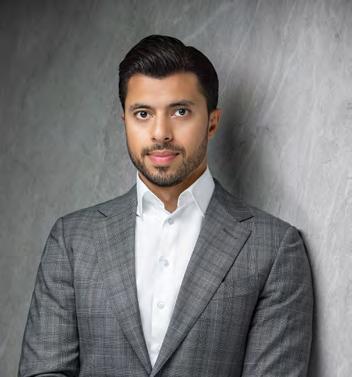
Mustafa Al Kaissi, Chairman
KASCO Developments, a new venture under the esteemed KASCO Group, marks its entry into the UAE real estate market, committed to crafting extraordinary living spaces that focus on wellness and innovative, user-centric design. Launched with an initial investment of over AED 1.2 billion, KASCO Developments creates lifestyle-driven residential projects that inspire and empower residents.
The flagship project, ONDA, launched in November 2024, is located in Business Bay, Dubai. This exclusive 23-floor community features 348 residences, including studios, one- and two-bedroom apartments, and three-bedroom options. Each unit boasts elegant, tranquil interiors and state-of-theart smart-home technology.
ONDA emphasises wellness through ample indoor and outdoor community spaces, wellness hubs, and extensive fitness facilities, including indoor and outdoor swimming pools, a running track, and a premium spa. Construction of ONDA began in Q4 2024, with completion anticipated in Q2 2027. The development promises residents a healthy and sustainable lifestyle.
Following the success of ONDA, KASCO Developments recently unveiled its second residential project, VAL. Nestled in Al Jaddaf Waterfront, VAL is a luxurious 13-floor community offering 121 thoughtfully designed residences, including studios, onebedroom, and two-bedroom apartments. The development features panoramic views and amenities such as a hotel-style swimming pool, fitness studio, and wellness areas, creating a serene oasis with an ideal blend of urban convenience and natural beauty. VAL is scheduled for completion in Q4 2026.
Both ONDA and VAL reflect KASCO’s philosophy of blending design, functionality, and wellness into each development.
KASCO has also revealed plans for a third project, VOLNA, which will aim to further advance its mission of delivering premium living experiences that enhance residents’ quality of life. With a vision to develop and sell 1 million square feet of residential projects by 2025, KASCO is on a path to becoming a prominent player in Dubai’s thriving real estate market.
Each project aims to provide more than residences, offering vibrant community experiences that foster well-being. The company’s approach is comprehensive and obsessively detail-oriented, ensuring that projects meet the diverse needs of modern living and align with sustainable building standards.

“We understand that residents seek more than just a place to live; they desire a space that truly enhances their lives. That’s why we’ve blended design, functionality, and an unparalleled ambience to create a truly transformative living experience.”
- Mustafa Al Kaissi


Lacasa Living is a boutique real estate developer leveraging over a decade of architectural and engineering expertise to deliver innovative, customerfocused projects. As the real estate development arm of the renowned Lacasa Group, Lacasa Living combines design excellence with a meticulous,

user-centric approach. The company’s mission is to create bespoke residential spaces that resonate with modern lifestyle demands in the UAE and beyond.
With a talented team of over 500 professionals and a legacy of completing more than 700 landmark
projects, Lacasa Living stands at the forefront of the industry. Its portfolio encompasses a whole range of residential offerings, from ultra-luxury private villas from their Signature Collecture to smart, modern apartments and bespoke holiday homes as part of the Exclusive Residential Developments. By


maintaining a balance of character, functionality, and refined aesthetics, the company delivers exceptional value across diverse market segments.
Leading the way
Emad Jaber founded the Lacasa Group twelve years ago and is the Chairman of Lacasa Living. With over 40 years of experience in the architecture and construction sectors, Jaber is a seasoned leader and one of the most influential design and architecture consultants in the region. His leadership has driven LACASA to design over 500 projects across the Middle East and Africa, including landmark developments such as Dubai Internet City, Jumeirah Beach Residence, and the Executive Towers.
Ahmad Jaber, CEO of Lacasa Living, drives architectural excellence and paves the way forward for the company. With a Master’s in Construction Management and a background in Civil Engineering, Ahmad Jaber brings a wealth of experience from designing and working on multiple high-profile projects, including Murooj Al Furjan and Cavalli Casa Tower. Ahmad’s strong foundation in project management and engineering consultancy ensures the successful execution of complex projects, meeting both client expectations and technical requirements.
Lacasa Living has strategically targeted key markets for its boutique developments, including Dubai, Ras Al Khaimah (RAK), and Qatar. The company’s recent handover of a private villa valued at AED 120 million in Dubai Hills highlights its ability to deliver high-value, tailor-made projects. Building on this momentum, Lacasa Living is launching its bespoke residential developments - Ola Residences - on Al Marjan

in January 2025. This development will feature stylish and functional apartments, targeting end users and investors in the region’s thriving real estate market.
Innovative Design Philosophy
Its distinctive, intentional approach to design is at the core of Lacasa Living’s success. Each project is crafted with a holistic vision, reimagining traditional real estate solutions to meet contemporary needs. Every detail, from structural components to furnishings, is purpose-driven to create seamless, community-oriented spaces. The result is developments that not only elevate their surroundings but also enhance the daily lives of their residents.
Lacasa Living has set its sights on rapid growth, with six projects currently in the pipeline. The company forecasts significant revenue growth, targeting AED 1.2 billion in 2025, AED 2 billion in 2026, and AED 3 billion in 2027. These developments emphasize ready-to-move-in properties integrating bespoke designs and functionality within vibrant, community-focused environments.
The Path Forward
With its strategic vision and customer-centric focus, Lacasa Living is redefining boutique real estate development. By creating vibrant communities and innovative spaces, the company is poised to shape the future of real estate in the region.
Through architectural innovation, meticulous craftsmanship, and strategic market positioning, Lacasa Living is not just building properties but creating spaces where people connect, thrive, and find lasting value.

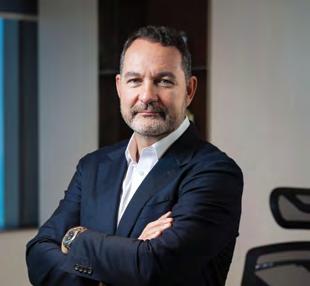
Michael Belton, CEO
MERED, an award-winning international real estate developer, is redefining the UAE’s real estate market with innovative, highquality projects. Partnering with renowned international architects and designers, MERED delivers functional designs with long-term value. CEO Michael Belton, with over 30 years of global experience managing real estate assets worth $5 billion, leads MERED’s growth across residential, mixed-use, and branded developments. Its flagship project, ICONIC Residences by Pininfarina in Dubai Internet City, will be the area’s tallest building at 290 meters, setting new benchmarks for premium real estate. This collaboration highlights MERED’s dedication to creating exceptional, well-connected branded residences.
MERED has expanded its portfolio in Abu Dhabi by acquiring two prime waterfront plots on Al Reem Island, covering 23,500 sqm. The development will feature luxury apartments, modern amenities, and conceptual retail outlets, contributing to the ADGM district and Abu Dhabi’s real estate growth. With the UAE’s property market set for significant growth, MERED focuses on strategic projects aligning with market demand. Led by Michael Belton, the company delivers high-quality, functional designs that meet global standards. From luxury residences to waterfront projects, MERED is shaping urban living by creating spaces that elevate lifestyles and offer strong investment opportunities.
Mr. Eight Development, a European property developer with over 20 years of success, is redefining family living in the UAE with boutiqueinspired residences that prioritize stylish design and personalized experiences. Focused on superior construction and community distinction, their projects feature a limited number of units to foster resident intimacy and include premium amenities. Expanding into Dubai Islands, the developer has secured eight plots and plans to launch five projects in 2025. Leading this initiative is Villa del Divos, set to debut in Q1 2025, marking Mr. Eight Development’s commitment to innovative, high-quality living in the region.
Residents of Mr. Eight Developments on Dubai Islands will enjoy exclusive perks, including a Members Club with Rolls-Royce chauffeurs, a luxury Riva boat, beach club access, valet parking, and on-site spa and bellboy services.
Emils Daujats, Director at Mr. Eight Development, spearheads sales efforts and manages broker relations for the company’s premium UAE projects. With extensive expertise in off-plan sales and international business development, Daujats plays a pivotal role in driving growth and revenue for the developer’s innovative ventures.
Each Mr. Eight Development project is uniquely designed, ensuring no two are alike.
“Our projects will offer a boutique resort experience, allowing residents to enjoy an unparalleled premium living environment. We plan to invest around one billion dirhams across our Dubai Island projects, ensuring they are exceptional in both design and construction quality.”
- Emils Daujats
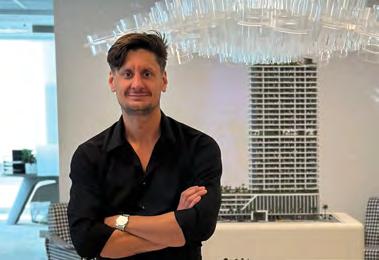


Egor Molchanov, Founder and CEO
QUBE Development, a trailblazer in residential and commercial real estate, leverages a 30-year legacy of excellence to redefine modern living in the UAE. Combining sustainable architecture, innovative design, and world-class amenities, QUBE creates vibrant communities that balance functionality with cutting-edge living experiences. Dedicated to durability, quality, and sustainability, the company empowers customers to build generational wealth through meticulously crafted spaces.
With AED 2.6 billion in projects set to launch by 2025, QUBE’s expansive portfolio spans 623,354 sq. ft. of land and 2,291,946 sq. ft. of GFA, raising the bar for real estate excellence in the region. Recently, the company officially broke ground on its visionary project, Arisha Terraces, located in Dubai Studio City.
Egor Molchanov, Founder and CEO of QUBE Development, brings extensive expertise in real estate, having overseen a master-development project spanning over 15 million sq. ft. and managed project economics and feasibility at a corporate level. With strategic partnerships and a history of executive roles in a leading real estate firm, Egor aims to position QUBE Development as a key player in Dubai and the UAE’s dynamic real estate market.
Ghaith A. Shocair, CEO
Launched in 2024 by Saif Al Ghurair Real Estate Group, P.O.B1 introduces a new era in Dubai’s real estate landscape. Its name, inspired by the iconic P.O. Box 1, reflects a strong connection to Dubai’s heritage and a commitment to innovation and excellence.
Building on SAGRE’s legacy of trust and credibility, P.O.B1 aims to enhance quality of life by creating destinations and homes that combine cutting-edge design, functionality, and value. With a customer-focused approach and meticulous attention to detail, the company consistently delivers personalised experiences that exceed expectations.
P.O.B1 redefines urban living by shaping exceptional lifestyles and fostering thriving communities. Through thoughtfully designed, sustainable projects, the company sets new industry benchmarks while adapting to market needs.
“Our commitment is to create resilient communities that foster belonging and retain value. P.O.B1 is positioned to deliver a strong pipeline of projects across Dubai’s growth zones, guided by a vision that aligns with the aspirations of future generations.”
- Ghaith A. Shocair


REEF Luxury Developments is a groundbreaking real estate developer based in Dubai that stands out for its innovative approach and commitment to quality. With over a decade of developing experience, REEF Luxury Developments is poised to transform Dubai’s residential landscape through innovation, community-focused projects and unique concepts.
One of REEF Luxury Developments’ standout features is its patented Climate-Controlled sunken balconies and winter gardens, a first-of-itskind concept that allows residents to enjoy outdoor living all year round in Dubai. Additionally, REEF Luxury Developments’ properties are equipped with smart home technology, energy-efficient appliances, and thoughtfully designed communal spaces that

foster a sense of connection and social interaction.
Currently, REEF Luxury Developments has secured a substantial land bank that will introduce approximately 5,000 residential units to Dubai. The company plans to launch projects valued at around AED 5 billion over the next quarter, with an ambitious aim of unveiling thirty projects aligned with the UAE’s robust real estate market, positioning REEF as a key player in shaping the growth and development of the region.
REEF Luxury Developments appeals to first-time buyers and seasoned investors seeking substantial returns due to the value provided by the innovative concepts.
With a vision for excellence, REEF Luxury Developments seeks strategic
partnerships with industry leaders in technology, sustainability, and design.
These collaborations enable integrating innovative solutions into every project, ensuring that REEF Luxury Developments remains at the forefront of the real estate industry. Under the leadership of CEO Samer Ambar, REEF Luxury Developments aligns with H.H. Sheikh Mohammed bin Rashid Al Maktoum’s vision to position Dubai as a global hub for innovation and excellence.
As REEF Luxury Developments prepares to launch its second residential project in Dubai, the future is promising for the company and the communities it aims to build. With a strong foundation of innovation, community focus, and strategic growth, REEF Luxury Developments’s future is promising.

Yogesh Bulchandani, Founder & CEO

Established in 2022, Sunrise Capital Real Estate Development has quickly become a boutique developer reshaping Dubai’s skyline with meticulously crafted projects. Building on the success of Sky Capital Group, founded by Yogesh in 2017 to focus on real estate investments, Sunrise Capital was created to address the demand for high-quality developments that deliver premium value at competitive prices.
With a vision to bring fresh and exciting projects to Dubai’s thriving market, Yogesh spearheaded the creation of Legend by Sunrise—a luxurious residential development featuring unique spaces and stunning vertical gardens. Strategically located in the heart of Arjan, this project embodies the blend of luxury and innovation that defines Sunrise Capital.
While this first project was a tremendous success, it drove Yogesh to set even higher goals for himself and his team –aiming to create landmark projects across UAE, especially
as the emirate’s real estate market began to soar in profile around the world. He focused on developing luxury residential apartments and villas in prime UAE locations, staying true to the culture and values of the region. Over the years, Sunrise Capital has become synonymous with luxury living, focusing on thoughtful design, operational integrity, and unwavering dedication to customer satisfaction.
The portfolio includes a range of flagship projects that showcase its commitment to quality and luxury.
One notable project is Legacy, a six-story residential building in Arjan offering 132 premium apartments that blend urban elegance with comfort. Looking ahead, Bellagio at Wasl Gate, scheduled for completion in 2027, is a 12-floor mixed-use development that includes ten luxury apartments and premium office space designed to cater to an elevated urban lifestyle.
Sunrise Capital distinguishes itself by integrating unique lifestyle features within its developments, including padel courts for recreation, valet services for convenience, and dedicated media rooms for modern digital creators. This focus on enhancing living experiences reflects the company’s commitment to creating vibrant communities.
Sunrise Capital prioritizes sustainability by adhering to Green Building Certification standards and adopting environmentally conscious practices. Initiatives such as AC water recycling, energy-efficient LED lighting, and sustainable materials highlight its commitment to minimizing environmental impact. The company integrates advanced technologies like post-tension slabs to enhance construction efficiency and crystalline waterproofing to improve structural integrity. Employing innovative methods like the Doka scaffolding system ensures efficient material use and waste reduction, promoting eco-friendly practices. Choosing a Sunrise property means investing in thoughtfully designed spaces that prioritize environmental responsibility, structural excellence, and a sustainable future.
In the years ahead, Sunrise Capital aims to strengthen its reputation for innovation, operational excellence, and sustainability while continuing to reshape urban communities with landmark projects. By prioritising customer care and attention to detail, the company is committed to building a legacy as the developer of choice in the emirate.
Nathan Hones, COO and Partner at Carter Hones Associates, highlights how their innovative strategies and expert management solutions drive the company’s role as one of the visionary industry leaders
How do you see the construction industry evolving in the Middle East over the next decade, and what trends should companies focus on to stay competitive?
Since the COVID-19 pandemic, we’ve seen a surge in establishing small and medium-sized construction companies looking to capitalise on the current boom in projects of all scales. However, it’s clear we’re in an upswing in the economic cycle, and only the most professional and resilient firms
will have sufficient work, clients, and supply chains to weather the next downturn. Companies must prioritise professionalism, quality, and reliable delivery to ensure consistent cash flow and long-term viability as ongoing concerns.
What are the biggest challenges you’ve encountered in delivering high-quality construction projects in the region, and how have you overcome them?


The Middle East is a vast and diverse region with widely varying maturity levels in construction and design. Cities like Dubai have been building at pace for over 30 years, giving clients, consultants, contractors, and suppliers ample time to refine their processes and teams to achieve high standards. Contrastingly, other regions and countries are still developing their construction regulations, workflows, and talent pools. This disparity makes it challenging to maintain consistent quality across the region, especially when the benchmark for many projects is the 5-star hotels of Dubai or the Grade-A commercial buildings of Abu Dhabi. Addressing these challenges requires a tailored approach, drawing

on our experience and setting realistic but aspirational targets for each project.
With sustainability becoming a key focus, how is Carter Hones Associates incorporating eco-friendly practices into its projects?
Sustainability is integral to our ethos at Carter Hones Associates. We hold three ISO accreditations, including ISO 14001, which provides a framework for environmental management systems. Beyond our internal practices, we
actively encourage clients and consultant partners to adopt sustainable initiatives in their projects. Over the years, we’ve found that achieving sustainability ratings—such as 3 Pearls under Abu Dhabi’s Estidama framework or LEED Silver certification—can often be cost-neutral. These ratings represent what we consider good building practice. We also urge clients to think of more ambitious sustainability goals, which, while involving an initial capital expenditure increase of 10–30%, can deliver
significant operational cost savings over the long term.
How do you view the role of emerging technologies like AI, robotics, and BIM in transforming construction processes and outcomes?
Construction has evolved with continuous speed, accuracy, and methodology improvements over thousands of years. Building Information Modelling (BIM), for instance, has been around for quite some time and is now being embraced as a standard, much like 2D CAD
was in its day. Technologies like AI and robotics are also becoming valuable tools, particularly for automating routine tasks such as minute-taking, 3D scanning, report writing, and snagging. These tools can enhance efficiency and reduce project timescales. However, AI currently falls short in areas requiring creativity and foresight—it cannot replace original thought or experience. Seeing how these technologies evolve to tackle more complex challenges in the coming years will be fascinating.
How have client expectations changed over 18+ years in the industry, and how does your firm address these evolving demands?
Interestingly, our clients’ core expectations have remained relatively consistent. They want assurance that their investments are protected, that their projects are delivered on time and that budgets agreed at the outset are adhered to. What has evolved is the way some clients prefer to track progress and receive updates. We’ve adapted our methods to provide clear, concise reporting on progress, risks, and key issues, often using digital tools to enhance visibility. However, for most clients, the priority remains understanding whether their project is on track and within budget rather than the specifics of how that information is communicated.
What opportunities and challenges do you foresee in the region’s push towards developing smart cities and mixed-use developments?
Smart cities present an incredible opportunity to enhance urban living by improving transportation systems, optimising energy use, increasing public safety, and generally elevating the quality of life for residents. However, for a city to truly become ‘smart’, governments must fully commit to a data-driven, technology-focused approach to decision-making.
This can be a significant challenge as it requires a forward-thinking, innovative mindset at all levels of government. It’s not just about making policies—it involves embedding this vision into city-wide urban planning and physical infrastructure development. Without unified agreement and collaboration, cities may call themselves ‘smart’ but fail to realise their full potential.
Success in this area depends on establishing clear objectives, adopting robust smart policies, and fostering partnerships between government entities, private sector players, and the community. Only then can cities unlock
the efficiencies and transformative benefits of smart technology.
With the industry’s rapid growth, what strategies do you suggest for addressing the talent and skills gap in construction and project management?
Change is inevitable in every industry, and construction and project management are no exceptions. Addressing the talent gap requires both strategic insight and proactive measures.
At Carter Hones Associates, for instance, we have formed an Innovation Team tasked with identifying emerging trends in technology and exploring how these can enhance our team’s skills for the benefit of our clients and projects.
Additionally, we conduct bi-annual Performance Development Reviews (PDRs) across the company. These sessions allow employees to identify their skills gaps, reflect on their progress, and voice feedback on areas for improvement. This approach fosters a culture of self-awareness and continuous learning.
While external factors such as regional mobility and industry demand may be outside our control, we focus on creating an environment where employees feel valued, supported, and aligned with our ethos. This builds a
strong company culture prioritising personal and professional growth, benefiting individuals, the organisation, and our clients.
What advice would you give aspiring professionals looking to build a successful construction and real estate career in the Middle East?
The Middle East is a dynamic region offering extraordinary opportunities for construction and real estate professionals. Countries across the region are embracing development, construction, and technological advancements to create a better future for their citizens and to improve the experience for visitors to our country.
Despite more than three decades of rapid growth, the region still presents immense potential for professionals seeking to work on innovative, iconic, and career-defining projects. Quick planning authority approval times, ample funding availability, and governmental initiatives to diversify economies away from oil have created a unique environment for growth.
No other region in the world is evolving socially, culturally, technologically, and physically remarkably. For aspiring construction professionals, the Middle East is the place to be. It offers unparalleled opportunities to contribute to transformative projects and leave a lasting impact on the built environment.


CBNME sits down with Mohamed and Tazmeen Kamdar, visionary Directors of Kamdar Property Development, as they unveil how dynamic accelerators are propelling their company to break boundaries and explore limitless horizons
Kamdar Property Development, a Dubai-based, familyled real estate developer and investment powerhouse, stands as a beacon of excellence in the UAE’s urban landscape. With an illustrious legacy spanning nearly four decades, the company is steadfast in its mission to craft exceptional properties that elevate the nation’s architectural tapestry. Guided by an unwavering commitment to quality, Kamdar Property Development consistently delivers meticulously designed developments, seamlessly blending elegance with reliability and setting a gold standard in timely project execution.
Can you walk us through your journey? What inspired you to expand Kamdar Property Development?
MK: Our father started the business four decades ago. Every child thinks of their father as their role model, and we have seen how he transformed a trading and textiles business into a diversified group with Silver Star Electronics, IT solutions and reselling, and property investment and development. Kamdar Property Development happened almost by chance. Initially, the group was diversified with a rental portfolio of private properties, and now it is entirely self-funding new developments for the public.
Kamdar has a strong global legacy. How has your international experience influenced your approach to real
estate development in Dubai?
TK: We’ve invested in and developed projects across Africa, Europe, and the Middle East to spread our global risk. This portfolio has been developed over many years, weathering the storm of major events like the financial crisis and COVID-19. One of the things we have noticed, both regionally and internationally, is that developers fail to deliver on their promises if there’s an economic turn. When we decided to expand our projects to the public, we wanted to ensure that no matter what, we would be able to complete the development fully with our funds and deliver construction projects on time.
What inspired the launch of 105 Residences in JVC, and how does it reflect Kamdar Property Development’s vision for luxury living?
MK: Firstly, the UAE market is one of the most exciting areas for real estate development. Its cities are growing rapidly, spurred on by a combination of strategic government vision, a buoyant economy, and safety and security. Secondly, JVC is an area with tremendous potential – not only is it one of the most popular areas for investors, but it is also being shaped at the master level into a highly liveable community. Part of creating a development focused on attainable luxury is selecting an area that is not already maximised in terms of value and one which, as time goes on and the community around it is built out, will shine as a high-quality property compared to the surrounding options.

105 Residences is Kamdar’s first project available to public investors. What motivated this shift, and how do you see it shaping the company’s future?
MK: The business has diversified over time across different sectors and countries. We realised that we do not have to retain all of the units we develop and that strategic property sales can uplift our short-term profitability and long-term goals to ‘give back’ as a developer. Over the coming years, we would like to deliver projects from which entire communities can benefit.
Sustainability is a growing priority in real estate. How does Kamdar Property Development integrate sustainable practices into its projects?


TK: It’s very important at every level. We see the government’s support for sustainability initiatives at the country and municipality level. Recently, the UAE was the first country to submit new goals for tackling climate change at COP29 in Baku – which directly impacts the policies being rolled out, from emissions to energy saving. At the master developer level, we are required (by Nakheel in JVC for 105 Residences) to deploy a green building consultant, ensuring that we meet our sustainability requirements, such as being energy efficient and having a low load on the master community.
Our construction teams identify sustainable building practices where we can minimise waste, reduce energy consumption and (where possible) use lower-impact materials. Internationally, we have deployed industrial warehouses in Africa powered entirely by solar energy, and within our Dubai offices, we are a paperless business across the group.
Technology is aiding us in driving more efficiency, and we would like to continue to enhance this area because sustainability is also something our customers care about.
What role does technology play in enhancing the design, construction, and management of Kamdar’s developments?
MK: We are very tech-driven – we prefer to follow the latest trends and technological advancements across the business. There is now a large workforce embedded in the software and technology we use. When you think of Tesla, two things come to mind: the vehicles’ technology and how the business shapes the industry in which it operates. Our scale as a business will be underpinned by how smartly we use the technological resources available – from how we use data analytics to identify the best strategic location for our subsequent development to the agile design and planning of development to AI management of
construction sites, the automation of daily processes and even how we market our new property launches. It’s all data-driven.
As Dubai’s real estate market evolves, what trends shape the industry, and how is Kamdar adapting to meet them?
TK: I think the real estate industry in Dubai was flashy for many years – big, eye-catching projects with celebrities to reel in global investment. The city is different now; it’s more mature, investors are savvier, and projects are being built to be lived in. There is a real demand for quality projects that people can call home or rent out for consistently strong yields.
With 105 Residences targeting a prime location in JVC, how do you envision the project standing out in a competitive market?
TK: It’s a brilliant question. There are many choices for investors and prospective homeowners across JVC and Dubai. We are just focused on what we are doing, not on what the competition is doing. We stick to some simple principles – close-knit family values, a relentless focus on quality and attention to detail, and sticking to the project timeline. One story that may demonstrate how much we care about each project is how we picked the bathroom tiles for 105 Residences. I went and selected from multiple options to ensure premium quality. We are proud of our family name, and as this is the first project we are unveiling to the public, we are determined to make it an impressive flagship.
What is your long-term vision for Kamdar Property Development, and how do you plan to expand its impact in the UAE and beyond?
MK: While we respect the heritage of our business, my father has instilled in us the desire to always look forward. We want to be ahead of the curve as developers. Over the next five years, our goal is to deliver 10 projects in the UAE and internationally.

Blurring Boundaries: From Biophilic Innovation to an Augmented Metaverse, where natural elements and digital advancements merge to redefine human-centric real estate
Words by: Khadeeja Hamid

AR can overlay dynamic information onto real spaces, guiding residents through greencertified features or providing interactive tours of local flora within biophilic settings
In a world increasingly defined by digital immersion, the future of real estate lies not in abandoning physical spaces but in reimagining them. As technological advancements like augmented reality (AR), virtual reality (VR), and the metaverse gain momentum, the challenge for developers isn’t to escape reality—it’s to make reality matter more. This is where the next frontier of real estate emerges: augmented somatic design, a fusion of human-centric biophilic principles and cutting-edge tech designed to craft spaces that resonate deeply with the body, mind, and soul.
Feeling Space, Not Just Seeing It
Spaces are no longer just backdrops for our lives; they actively participate in our wellbeing. Augmented somatic design prioritizes how a space feels rather than merely looks. It taps into the principles of multisensory and biophilic design—integrating natural light, organic materials, and living elements like greenery— to create innately restorative environments.
Consider a more innovative example, such as the Aljada project in Sharjah, which incorporates smart technology and urban green spaces to foster an immersive lifestyle. Combining walkable layouts with interactive public areas, Aljada’s design moves beyond the typical sustainability narrative to offer spaces that actively engage the senses and adapt to the needs of its inhabitants. Merging biophilic elements like shaded outdoor zones with advanced tech solutions provides a nuanced take on connection—to nature, cutting-edge infrastructure, and a more integrated way of living.
Yet, the somatic experience doesn’t stop at what you can touch or see. Soundscapes, ambient temperatures, and scent branding are deployed to craft an immersive sense of place. Luxury lobbies in developments across the GCC use cooling marble underfoot, curated lighting, and signature fragrances to evoke calm and exclusivity—an approach that extends
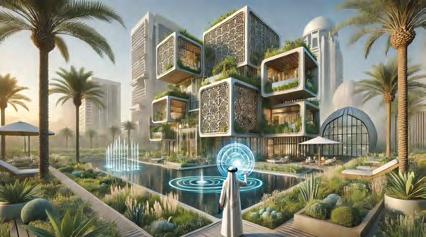
beyond aesthetics into the realm of embodied experience.
The metaverse and its associated technologies—AR, VR, and digital twins—are often discussed as a parallel universe. But their true potential lies in how they can augment our experience of real spaces. Imagine designing a new development with a digital twin: a virtual model that allows architects, clients, and future residents to navigate the space before it is built, testing the light, sound, and flow in real-time. This technology is no longer speculative; it’s being actively integrated into projects across the GCC.
For developers, AR and VR provide tools to enhance the somatic connection. AR can layer dynamic information onto real spaces, from guiding residents through greencertified features to offering interactive tours of local flora in biophilic environments. VR allows potential buyers or tenants to “inhabit” spaces virtually, not just seeing layouts but experiencing how the space might feel—lighting adjustments, sound dampening, or even seasonal variations can be simulated.
Yet, it’s not about replacing physical space with digital. Instead, the interplay between AR/VR and biophilic principles can amplify the connection to the real world, making spaces feel more intuitive and human, even in their design phases.
Biophilic design has evolved as a necessity and a statement in the GCC, where extreme climatic conditions and rich cultural traditions intersect. Climatic response is woven into every aspect of augmented somatic design in the region. Traditional elements like wind towers for natural ventilation or mashrabiya screens for shading are being reimagined with high-tech materials to ensure energy efficiency and comfort.
One compelling example is The Red Sea Project in Saudi Arabia, which blends biophilic design and technological innovation on an unprecedented scale. This development aims to balance highend tourism with environmental preservation, integrating data-driven climate modelling to protect local ecosystems while creating immersive, human-centric experiences. The project’s design includes sustainable accommodations that merge with the natural landscape, using local materials and advanced cooling systems. Beyond its environmental commitments, it offers a vision for future developments prioritising ecological integrity and multisensory luxury. The result is a living environment that feels simultaneously cutting-edge and deeply rooted.
The future of real estate doesn’t just look different; it feels different. Multisensory design—engaging sight, sound, touch, and even taste and smell—creates spaces that linger in memory. Hotels, for instance, are increasingly investing in signature scent branding and acoustic design to shape guest experiences, while luxury residences are adopting materials that
evoke tactile warmth, like textured wood and natural stone.
Developers in the GCC are also experimenting with lighting systems that mimic circadian rhythms, ensuring spaces support human biology. Imagine entering a workspace that subtly adjusts lighting and temperature based on your activity or time of day—creating an environment where productivity and well-being coalesce. These innovations signal a shift from static design to spaces that adapt to their inhabitants in real-time.
While technology continues transforming the real estate industry, the core challenge remains profoundly human: creating spaces that feel real in an increasingly virtual world. Augmented somatic design offers a blueprint for this future. The GCC is poised to redefine how we experience the built environment by merging biophilic inspiration, sensory architecture, and advanced technologies.
This trend represents not just a design philosophy but a competitive edge for potential clients and stakeholders— whether luxury developers, smart-city planners, or sustainability advocates. Real estate projects prioritising the human experience will attract investors, residents, and businesses seeking to align with forward-thinking, people-centric values.
The GCC is uniquely positioned to lead this transformation in a region known for pushing boundaries. Augmented somatic design, at its core, isn’t about abandoning technology or tradition but about weaving them together to create spaces that don’t just house us but inspire us. As real estate evolves, the question isn’t whether spaces will become smarter or greener—it’s whether they will feel more human. In that case, the GCC is already ahead of the curve.

Words by: Aya Zhang
The GCC real estate market is exciting more than ever, with each country in the region showcasing unique trends and opportunities.
From Dubai’s booming luxury market and Riyadh’s growing residential demand to Qatar’s stability and Bahrain’s regulatory advancements, the landscape is as diverse as it is promising. This article explores the latest developments across key GCC markets, highlighting the factors driving growth, investment opportunities, and the future for buyers and investors alike.
Dubai & Abu Dhabi, UAE
Dubai remains one of the world’s most attractive destinations for real estate investment. This is due to its taxfree environment (no real estate tax, capital gains tax, or income tax) and booming construction sector. Luxury developments are being sold off-plan, allowing buyers to secure properties before completion.
According to Bayut, there were more than 169,000 transactions in the past 12 months, marking a 38.7% increase compared to the previous year. The sales value reached USD 133 billion (AED 488 billion), a 28.3% rise, while the average price per square foot grew by 5.6%, reaching USD 472 (AED 1,734).
In addition, Dubai offers the highest gross rental yields among Dubai, London, and New York, with a rate of

Cushman & Wakefield reported a decline in residential sales transactions in 2023, with a 16.2 drop compared to the previous year, building on a more significant decrease of 25.5 in 2022
7%. This is almost four times higher than London’s 2.4% and nearly double New York’s 4.2%.
Like Dubai, Abu Dhabi’s real estate market has been growing. From January to September 2024, the market recorded USD 15.1 billion (AED 55.4 billion) in transactions, spread across nearly 18,000 sales and mortgage agreements. Of this total, USD 8.3
billion (AED 30.5 billion) came from sales, while USD 6.8 billion (AED 24.9 billion) came from mortgages.
Riyadh & Jeddah, KSA
Demand for residential real estate remains strong in Riyadh and Jeddah. The cities’ 3.3% annual population growth from 2024 to 2027, fuelled by domestic migration and expat inflows, is driving the demand.
According to JLL’s KSA Market Dynamics Report H1 2024, residential property prices in Riyadh rose 10% year-on-year in H1 2024, while Jeddah saw a 5% increase. Rental yields are equally promising, with year-on-year growth of 9% in Riyadh and 4% in Jeddah. Additionally, the total number of real estate transactions in Saudi Arabia surged by 38% in H1 2024, totalling over 106,700.
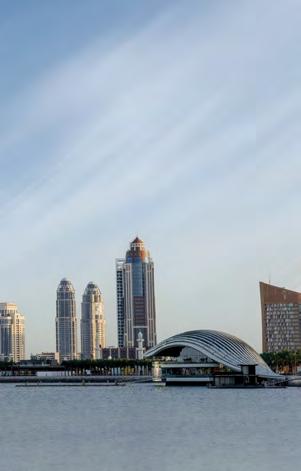
Qatar’s real estate market in 2024 displayed stability, although a gap emerged between prime and lowerquality properties.
According to Cushman & Wakefield, residential sales transactions declined in 2023, dropping by 16.2% compared to the previous year and following an even larger 25.5% decrease in 2022.
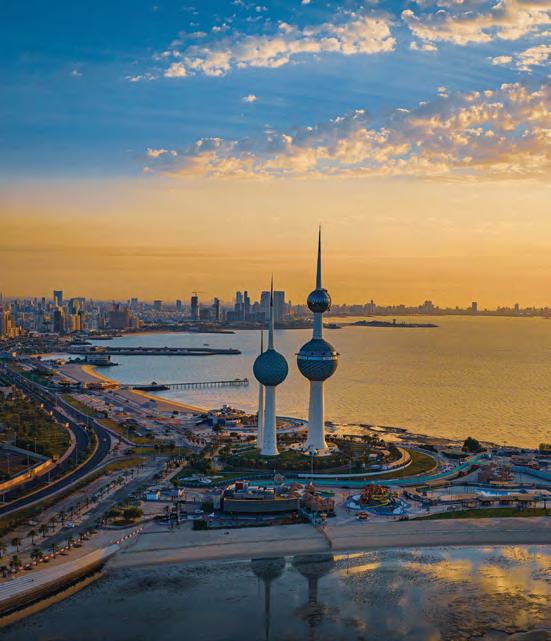
Bahrain has reported an 18 increase in transaction values during Q3
This marked a significant shift from the robust growth witnessed in 2020 and 2021. However, early 2024 has shown promising signs of recovery, with residential sales increasing by 30% year-on-year in the first two months.
While high interest rates in H1 prompted a surge in mortgage activity, buyers slowed down in H2, anticipating further rate cuts.
Qatar introduced its real estate
regulator, Aqarat, alongside new property ownership regulations. These initiatives aim to attract international investment to Qatar’s market in 2025 and beyond.
Manama, Bahrain
Bahrain’s real estate market experienced robust growth in 2024. The Real Estate Regulatory Authority reported an 18% increase in transaction values during Q3, reflecting the country’s growing appeal to investors.

Sheldon Labuschagne, CEO of Knightsbridge Group
A global roadmap for Dubai-based investors exploring international real estate opportunities by Sheldon Labuschagne
Dubai’s zero-tax policies and strategic location make it a hub for global investors. But for many high-net-worth individuals, the city is more than a financial base—it’s a launchpad to explore global opportunities. For savvy investors, international real estate presents a unique opportunity to pair financial stability with lifestyle rewards.
Yet, while the appeal of portfolio diversification is undeniable, the logistics can feel overwhelming. From navigating complex property laws to understanding taxation and financing, each market has its challenges. The key lies in understanding how to leverage opportunities while mitigating risks.
The need for diversification is simple: relying on a single
market concentrates your risk. Holding properties exclusively in one market exposes your portfolio to unnecessary risks, including economic slumps, regulatory changes, or other localised challenges.
Any downturn—a policy shift or market fluctuation—could significantly impact your holdings. Diversification mitigates these risks by spreading your investments across different regions and property types. This approach allows you to tap into multiple markets, each with unique opportunities and strengths, while protecting your wealth from volatility in any location.
For example, an investor with rental properties in London, vacation homes in Spain, and high-growth assets in Southeast Asia can offset losses in one market with gains in another. This broader strategy manages risk effectively and positions investors to capitalise on growth trends in global markets.
But expanding your portfolio internationally isn’t just about buying properties in different countries; it’s about understanding the game rules in each location. Every country has its own property laws regulating foreign ownership, transaction processes, and compliance requirements.
For instance, the UK remains a favourite for international investors due to its relatively relaxed rules and stable property market. Conversely, Spain welcomes foreign buyers but imposes taxes on rental income and has stricter loanto-value limits for non-residents. There’s Thailand, where foreigners can purchase condominiums on a freehold basis, but land ownership is restricted to leasehold arrangements.
Failing to understand these nuances can lead to costly mistakes. This is where engaging a local lawyer or real estate expert becomes invaluable. They can help ensure your investment complies with local regulations, safeguarding your interests and enabling smooth transactions.
Of course, no discussion on global real estate would be complete without tackling taxation. Taxes on international properties can significantly impact your bottom line, so understanding them is crucial.
Rental income from international properties is often taxed in the host country. For instance, in Spain, non-residents pay up to 24% on rental income, although EU residents may qualify for certain deductions. In Portugal, non-residents’ rental income is taxed at a flat rate of 28%. Double taxation treaties between the UAE and many countries can help prevent double taxation on the same income, but consulting a tax advisor is essential to ensure compliance and optimize tax efficiency.
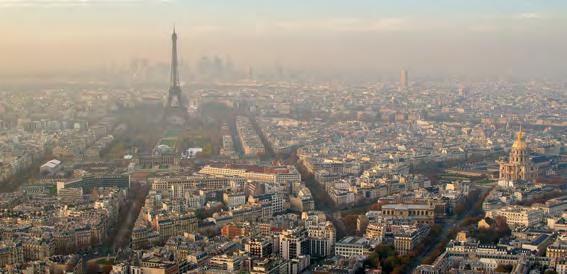
Capital gains taxes, applied to the profit made when selling a property, also vary by jurisdiction. In the UK, foreign investors are subject to capital gains tax on residential property sales, while countries like Germany offer exemptions if the property is held for more than ten years. Additionally, transaction taxes such as stamp duties or transfer taxes can add significant costs to your investment. Spain, for example, imposes transfer taxes ranging from 6% to 10% on secondhand properties, while new builds are subject to VAT.
Each country’s tax regime requires careful navigation, mainly if investing in multiple jurisdictions.
Another critical consideration is financing, as it requires consideration of both local and home-country options. For non-residents, securing a mortgage can involve higher down payments and more stringent requirements. In Spain, for example, non-residents typically face a loan-tovalue ratio of 60%, while residents can borrow up to 80%. Similarly, UK lenders offer specific buy-to-let mortgages for foreign investors, but you must provide detailed documentation to comply with anti-money laundering regulations.
Currency fluctuations are another
critical factor. Financing a property in a foreign currency exposes you to exchange rate risks, which can increase repayment costs. Hedging tools like forward contracts or currency swaps can mitigate these risks, though they may complicate your financial strategy.
For Dubai-based investors, multicurrency mortgages offered by UAE financial institutions provide a convenient alternative. They allow repayments in dirhams, reducing the impact of exchange rate volatility.
For many UAE-based investors, the appeal of international real estate isn’t just financial returns. It’s a way to enhance quality of life, secure residency in desirable locations, and access global opportunities. Many countries link property ownership to residency programs, which can offer significant advantages.
Programmes like Portugal’s Golden Visa allow investors to secure residency by purchasing property worth €500,000 or more. This grants access to Portugal’s highquality lifestyle
and enables visa-free travel across the Schengen Zone. Similarly, the UK’s Investor Visa attracts high-net-worth individuals with a fast-track path to residency for substantial investments, including real estate.
For Dubai residents, lifestyle benefits and investment returns often go hand in hand. For example, a holiday property in Greece or Spain can serve as a personal retreat while generating rental income through short-term leases. These dual-purpose investments allow you to align financial returns with personal lifestyle goals.
Ultimately, the key to creating a successful international real estate portfolio is aligning your investments with your unique financial and lifestyle goals. Everyone’s situation and motives are different. A well-structured approach is essential, whether acquiring a holiday home in Southern Europe, leveraging a residency-byinvestment program, or diversifying income streams across stable and high-growth markets.
Navigating international real estate can be complex, but professional guidance can transform it into a seamless process. Contact our team for tailored strategies and expert support in building and managing an international property portfolio that delivers financial security and personal satisfaction.


Why Developers Have Improved Their Office Spaces To Enhance Tenant Experience?
What if your office space could do more than house your business—what if it could drive growth, innovation, and overall employee wellbeing?
As Dubai cements its position as a global business hub, the commercial real estate landscape is undergoing a significant transformation. Post-pandemic trends, hybrid work models, and a renewed focus on employee well-being have redefined tenant expectations for office spaces.
Today, the question is no longer where to locate a business but how that location can drive productivity, foster innovation, and enhance employee wellbeing. Central Park Towers, DIFC
is a prime example of how a welldesigned, tenant-centric property can offer value beyond the lease agreement, with over 200 companies occupying more than 855,579 sq. ft. of office space.
Why Tenant Experience Matters: From Cost Center to Strategic Asset
Traditionally, office spaces were viewed as cost centres—necessary but static. With businesses expanding in the post-pandemic era and hybrid working models increasing demand for flexible office spaces, the commercial market is set for continued expansion. By 2025, it’s estimated that Dubai’s commercial real estate will have a 10% -12% rise.
Today, office spaces have grown into strategic assets that can
influence key business outcomes such as:
• Retention: Studies show that a poor office environment would prompt companies to consider leaving or staying at their current place of work.
• Productivity: A welldesigned, wellness-integrated workspace can boost employee productivity
• Brand perception: For companies seeking to attract global talent and clients, a premium office space reflects innovation, stability, and a commitment to employee well-being.
The New Tenant Expectations
The shift to prioritizing wellness amenities, sustainability, and flexibility when choosing office spaces is reshaping Dubai’s commercial real estate market, driving demand for properties beyond traditional offerings.
Central Park Towers, DIFC has responded to these evolving demands, achieving a high tenant retention rate in its office tower—a rare feat in this competitive market. But what exactly sets it apart?
Key Trends Shaping Dubai’s Commercial Real Estate
1. The Productivity-Wellness Connection
Employee well-being has shifted from a nice-to-have to a core driver of business performance. Studies show that companies that prioritize wellness in their workspaces can see a boost in productivity and a significant reduction in absenteeism.
Central Park Towers, for instance, has implemented innovative wellness programs and seasonal workshops to promote employee well-being and create a sense of community within the


development. This connection between wellness and productivity is at the heart of the tenant experience.
The property also offers a range of wellness-focused amenities, including green spaces, natural lighting, and onsite fitness facilities. Regular wellness events and healthy dining options further enhance the work environment, making it easier for tenants to foster a happy and productive workforce.
The development’s state-of-the-art facilities and strategic location have also contributed to its high tenant satisfaction rates. While location remains crucial, tenants now seek properties that offer more than proximity. Ease of access to key business locations, connectivity, and reduced commuting stress is essential for attracting top-tier tenants.
Central Park Towers, DIFC enjoys an enviable position at the entrance of DIFC with four easy access points and connections to key areas like Downtown Dubai, Sheikh Zayed Road, and The Financial Centre Metro Station.
Additionally, its bridge link to Gate Avenue allows tenants to navigate
DIFC effortlessly, connecting them to a vibrant ecosystem of financial institutions, government entities, and service providers. This unmatched connectivity, coupled with some of the best parking offerings in DIFC, positions the development as the best-connected building in DIFC, giving its tenants more convenience and accessibility.
3. Community and Experience Over Square Footage
While a prime location remains critical, tenants increasingly value being part of a vibrant, connected community. They want their office environment to offer more than proximity to clients—it should also provide opportunities for networking, shared experiences, and a sense of belonging.
Modern tenants want to be part of a vibrant, connected community. Office buildings that foster a sense of belonging through networking events, shared spaces, and community-driven initiatives are in high demand.
For tenants, this shift represents a new way of working where office life integrates with social and professional networks, driving employee satisfaction and business growth. This combination enhances employee satisfaction and strengthens company culture, setting the stage for long-term success.
and Opportunities: A Forward-Looking Perspective
As the commercial real estate market in Dubai continues to evolve, landlords face several challenges:
1. Rising tenant expectations for wellness and sustainability.
2. Increased competition from new, tech-enabled properties.
3. Economic uncertainties that require flexible and adaptive leasing models.
However, these challenges have also presented opportunities for forwardthinking properties like Central Park Towers DIFC to lead the market by:
• Investing in cutting-edge amenities that prioritize tenant well-being.
• Leveraging smart building technologies to enhance the tenant experience and reduce operational costs.
• Creating community-focused environments that go beyond offering space to providing a lifestyle.
The Future of Dubai’s Commercial Hubs
The success of commercial properties in Dubai will hinge on their ability to deliver integrated, adaptable, and people-centric environments. Forwardthinking developments are already leading the way, demonstrating that the future of real estate lies in fostering communities where businesses—and their people—can thrive.
Developments like Central Park Towers are at the forefront of this transformation. By prioritizing tenant experience, sustainability, and innovation, Central Park Towers has successfully attracted and retained a diverse range of prestigious tenants. The development’s focus on creating a vibrant and collaborative community has significantly contributed to its success and has set a new benchmark for office spaces in Dubai.
For tenants navigating this dynamic landscape, the right office space is not just about location—it’s about experience, innovation, and community.
Is your office space helping you grow?

The UAE’s real estate and construction outlook for 2025
The UAE’s real estate market saw remarkable growth in 2024, driven by rising demand for luxury properties, sustainable developments, and a thriving commercial sector. Investors increasingly recognised the UAE’s appeal for
high capital appreciation, strong rental yields, and its position as a global hub. However, while emirates like Dubai and Abu Dhabi remain prime destinations for both local and international investors, there are some uncertainties about the market’s future.

One significant trend that shaped the UAE’s real estate market in 2024 was the surge in luxury properties. Knight Frank reported that Dubai positioned itself as one of the most attractive and affordable luxury real estate markets globally, attracting Ultra High Net Worth Individuals (UHNWIs) worldwide. Dubai led the world’s USD 10 million+ home sales, fueled by competitive pricing, world-class infrastructure, and the city’s status as a global hub for business, leisure, and innovation. The UAE’s luxury real estate sector offered a range of high-end developments, from iconic skyscrapers and waterfront villas to state-of-the-art smart homes. UHNWIs were drawn to the city for its prestigious properties, promising investment opportunities, lucrative rental yields, and capital appreciation. The UAE’s favourable regulatory environment, tax benefits, and business-friendly climate further enhanced its attractiveness.
The growth in Dubai’s real estate market was also due to global awareness among investors of Dubai as a stable, modern, and innovative city that offers a high quality of life and rental returns above most parts of the world. Additionally, the UAE’s currency is pegged to the US Dollar, reducing currency exchange risk. This stability made the UAE an attractive option for wealthy investors looking to hedge against high inflation in their home countries.
However, while the luxury market saw substantial growth in 2024, there are questions about the sustainability of such growth in the coming years. Like all market cycles, a slowing growth is likely, but the sector will remain robust.
This brings us to the discussion of affordable and inclusionary housing.
In 2025, the demand for affordable housing and inclusive living spaces is growing, particularly in emerging markets and rapidly expanding urban areas. Governments and private developers are addressing housing shortages through modular construction, prefabrication, and public-private partnerships. There is also an increased focus on designing homes that are inclusive for people with disabilities and accommodate a range of lifestyles. Smart housing developments aim to provide flexible living spaces that can adapt to changing needs over time.
Making Dubai more affordable for the working class is crucial to maintaining its competitive advantage over other major global cities. Rents have substantially increased over the last few years, along with other inflationary effects on food and clothing, while salaries have seen little to no change. Addressing this issue is essential to ensure that Dubai remains an attractive place to live and work for a diverse population.
High capital appreciation has been a significant driver throughout the current market cycle. However, this reflects the market recovering from the pandemic. As the market stabilises, with the completion of numerous off-plan projects outpacing population growth, there could be a return to market fundamentals. In 2025 and 2026, investors will likely focus more on current rental yields to justify purchases, with less emphasis on capital appreciation.
The Dubai Land Department (DLD) has played a crucial role in making
the real estate industry more transparent and accessible. By releasing comprehensive property data and streamlining land registration procedures, the DLD has made Dubai one of the world’s easiest places to buy and sell real estate. This transparency has boosted investor confidence and contributed to the market’s overall efficiency.
Furthermore, the financial landscape of real estate and construction is evolving with new investment strategies and funding models. Crowdfunding and real estate investment trusts (REITs) are gaining popularity. These platforms provide access to diversified property portfolios, democratising real estate investment for smaller investors. Traditional banks and financial institutions increasingly integrate fintech solutions to streamline lending processes, offering faster and more efficient financing options. These innovations make real estate financing more transparent and accessible to a broader audience.
While 2025 is set to witness transformative changes in real estate and construction, driven by technological advancements, sustainability, and urban development, it is still too early to tell if the remarkable growth seen in 2024 will continue or if the market has reached its peak. As stakeholders adapt to these innovations, the future of real estate promises increased efficiency, enhanced experiences, and a commitment to sustainable and inclusive growth. However, the influx of off-plan units compared to population growth raises questions about the longterm sustainability of the current market dynamics.

Dr. Hassan Albalawi, CEO and Founder at WakeCap
With the announcement of Saudi Arabia as the host of the 2034 FIFA World Cup, there’s more attention on the Kingdom’s ambitious construction vision than ever before. The impact of the world’s most high-profile sporting event in the country will of course be enormous, boosting its economy, tourism, and construction industry as the
country prepares to host all 104 games and welcome a huge influx of visitors.
As a construction technology leader in Saudi Arabia, WakeCap has been at the forefront of the conversation around how the latest tech is fuelling innovation and growth in the Kingdom since 2017 and we’re proud to be part of this transformation. By providing the tools to improve safety, productivity, and efficiency, the company is helping to drive a better future for construction in the Middle East.
Technology is not just speeding up constructionit’s changing the way we build. In 2025, construction technology will no longer be a “nice-to-have” but a fundamental part of doing business in Saudi Arabia and the Middle East. From real-time IoT data to AI-driven insights and sustainable, safer building practices, ConTech will empower developers to tackle the region’s most ambitious projects.
Here are the key technology trends set to shape the construction industry in 2025.
1. On Time: Tech That Streamlines Deadlines
The world’s best management tools are crucial when overseeing highly complex sites and projects that have a non-negotiable deadline. Internet of Things (IoT) devices and wearables are becoming increasingly sophisticated, able to address and solve complex, long-standing pain points.
By 2025, even more construction sites in Saudi Arabia will be fully connected ecosystems, as the use of tech is mandated more and more by leading developers. For the successful delivery of the FIFA World Cup 2034, the arenas and other facilities must be built on



schedule, so real-time insights are crucial. WakeCap’s tech already gives Saudi Arabia’s project owners and managers the ability to recognise when they need to get back on track or make nimble changes. Our IoT-enabled wearable devices provide real-time data on worker location, activity, and safety on sites. These insights enhance productivity and reduce risks.
The rise of digital twins (virtual replicas of physical assets) during construction is having a growing impact on projects in the Middle East. Unlike previous generations, when digital twins only allowed developers to see an accurate representation of a building site or building’s performance, they can now show construction and operations, as well as how a building will function, allowing for smarter workflow and design decisions.
At the Paris Olympics, digital twin technology was widely used to design stadium and competition venues; I’m excited to see how this powerful tech is used to create the blueprint for Saudi Arabia’s FIFA World Cup sports venues and related infrastructure.
The Saudi energy industry is leading the world in adopting technology to improve worker safety and create a culture of safety. By integrating IoT and wearable technologies on construction sites, companies are already improving safety by monitoring real-time conditions such as work cycle compliance, falls and impacts, SOSes, speeding vehicles, high heat index, and hundreds of safety failure conditions. Safety command centers are being widely adopted to react to alerts
and centralise management of even the largest projects. Contractors from around the world that are working in KSA are following these procedures.
AI has become increasingly integrated into construction site management and its use is set to become more standard. One of the main challenges for new technology has been the resistance to its adoption. With AI, resistance has been replaced with excitement about its potential and how its many uses can be best harnessed. For construction, AI’s power for predictive analytics will increasingly become a standard tool for managing schedule risks, optimising schedules, and reducing costs. These capabilities are invaluable and the ability to simulate project outcomes and make data-driven decisions in real time ensures that ambitious timelines can be met without sacrificing quality.
5.
Collaboration technologies are becoming increasingly important as projects grow in scale and complexity. One of the key trends that drove development in construction tech this year was the increase in collaboration between different technology providers: we’ve played a key role in offering a ‘one vendor solution’ to companies such as ARAMCO, who want to integrate technology progressively and want one entity to manage this often complex process. One thing we have seen is that the high initial cost of implementing tech can deter smaller contractors; governments and large developers can incentivise tech adoption through subsidies and partnerships.
In 2025, cloud-based platforms and Building Information Modeling (BIM) will be increasingly integrated into the region’s construction workflows. These tools foster collaboration between stakeholders for better communication, and enhance safety protocols. BIM, in particular, provides a unified model of a project, reducing errors and supporting better planning and reducing incidents on site.
Sustainability is not just a trend, but reflecting it meaningfully at every stage of construction remains a challenge. I hope that in 2025, Saudi Arabia and the Middle East will see greener technologies making an impact in construction. From energy-efficient materials, smart HVAC systems, renewable energy integration, to cloud-based tech that streamlines wastage and reduces costs, greener tech can help a site’s bottom line.
As Marketing Manager at DLR Group Middle East, she takes us through her groundbreaking efforts in elevating the architecture firm’s brand and positioning in the region

Tell us about yourself and your role and responsibilities at the company.
My career has been an exciting journey, starting as the first female sports TV presenter on MBC, where I not only hosted but also produced the channel’s top-rated sports shows and news. From covering the FIFA World Cup to creating engaging content for diverse audiences, I learned how to craft compelling narratives and connect with people.
That passion for storytelling led me into the world of marketing, events, and advertising, where I’ve held leadership roles across various industries. I’ve managed high-profile campaigns, launched impactful events, and worked with renowned brands such as Warner Bros., Majid Al Futtaim, and Global Village.
At DLR Group, I bring this rich
background to my role, where I oversee marketing efforts for our Middle East operations. I’m responsible for developing strategies, creating content, managing campaigns, and ensuring that our marketing initiatives amplify the incredible work we do.
What do you believe are the biggest challenges currently facing Marketing, and how do you plan to address them? One of the biggest challenges is demonstrating tangible value to decision-makers in a way that builds trust and long-term relationships. Unlike B2C, where purchases are often emotional or impulsive, B2B marketing requires us to communicate the ROI and strategic benefits of our offerings to sophisticated, informed audiences. By demonstrating our ability to solve complex problems, we position DLR Group
as a trusted partner, not just a service provider.
In our industry, it is important to leverage the talent within our team to align our expertise with client needs at the right moments. Whether it’s featuring our design leaders in industry panels or collaborating with publications to deliver meaningful content, the key is to connect authentically with clients, offering them insights and solutions that genuinely address their challenges.
Looking ahead, what are your goals and aspirations for the future of the company’s Marketing?
My goal is to position DLR Group as a thought leader in the Middle East by showcasing not only the incredible talent within our team, but also the exceptional projects we deliver and the way we work as an integrated design firm. I want our marketing to highlight the synergy between our disciplines and global offices, which enables us to create innovative, human-centered solutions.
By celebrating the unique stories behind our projects and the expertise of our people, we can inspire our audience and demonstrate the impact of our work. Whether it’s through thought leadership, immersive content, or industry events, I aim to elevate how we communicate our value to clients and partners.




